Market Dominance Guys
Experience sales thought leadership that leaves you shaking inside with Market Dominance Guys, the definitive podcast for B2B sales excellence. Industry veterans Chris Beall (ConnectAndSell founder/CEO) and Corey Frank (Branch49 CEO) deliver unfiltered insights from decades of sales leadership and market domination experience. Unlock the secrets behind successful cold calling campaigns, and pipeline generation strategies used by top-performing sales organizations. Learn from real practitioners who’ve generated millions in revenue through authentic conversations, trust-based relationships, and systematic market penetration.
Episodes
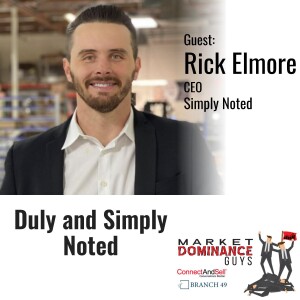
Tuesday Nov 08, 2022
EP155: Duly and Simply Noted
Tuesday Nov 08, 2022
Tuesday Nov 08, 2022
Who would have guessed that hand writing a note to 500 prospects would be a highly successful marketing campaign? Our guest, Rick Elmore, did! Founder and CEO of Simply Noted, Rick joins our host, Chris Beall, today to discuss his career path from college, to professional NFL football player, to a job in medical device sales and marketing, to a startup company now in its fourth year. It was the success of his handwritten-notes campaign that encouraged Rick to found his own business, offering this same service — now automated — to help individuals and companies utilize the personal touch of what looks like a handwritten note to reach out to their customers. Rick and Chris talk about the open rate of these notes versus the open rate of cold — or even warm — emails. You’ll want to hear it with your own ears on this Market Dominance Guys’ episode, “Duly and Simply Noted.”
About Our Guest
Rick Elmore is the founder and CEO of Simply Noted in Tempe, Arizona. Simply Noted is a company that utilizes software and robotic technology to create personalized handwritten notes for its 300,000 monthly users.
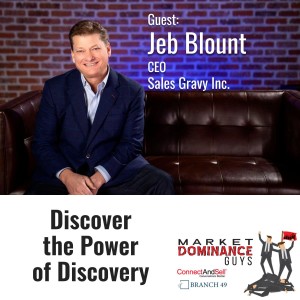
Wednesday Nov 02, 2022
EP154: Discover the Power of Discovery
Wednesday Nov 02, 2022
Wednesday Nov 02, 2022
Most sales reps think discovery isn’t sexy: Closing the deal is. But “Deals are won or lost in discovery,” cautions Sales Gravy CEO Jeb Blount, today’s podcast guest. This successful author of 15 sales-related books advises that “80% of your time in the sales process should be in discovery,” especially during a recession, when the discovery call becomes even more important. In this second of two interviews with Jeb, our Market Dominance Guys’ hosts, Corey Frank and Chris Beall, share sales-success nuggets taken from Jeb’s most recent book, Selling in a Crisis: 55 Ways to Stay Motivated and Increase Sales in Volatile Times. You’ll want to listen closely as these three like-minded sales gurus explain their own discovery-call practices for establishing trust and how they get prospects to open up to them. All of this and so much more in today’s Market Dominance Guys’ episode, “Discover the Power of Discovery.”
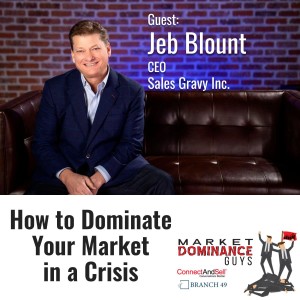
Tuesday Oct 25, 2022
EP153: How to Dominate Your Market in a Crisis with Jeb Blount
Tuesday Oct 25, 2022
Tuesday Oct 25, 2022
What changes should you make when you’re selling in an economic-downturn period? Today’s podcast guest, Jeb Blount, is CEO of Sales Gravy and a successful author and podcaster. With 15 books to his name, including his latest, Selling in a Crisis: 55 Ways to Stay Motivated and Increase Sales in Volatile Times, it’s obvious that Jeb knows what he’s talking about when discussing sales techniques during these troubled times. His suggestion? You’ve got to pay close attention to patterns, as well as the signals you’re getting from prospects and customers. In this first of two interviews with our Market Dominance Guys’ hosts, Corey Frank and Chris Beall, Jeb shares his advice about selling a price increase to customers, and about honing and re-honing your message as fears about the current economy’s impact are revealed in your prospects’ objections. Jeb’s also a firm believer in selling alongside his sales team and listening to his reps’ calls to provide just-in-time coaching. Get ready to take notes as this master of selling practices lets you in on what works and what doesn’t in today’s Market Dominance Guys’ episode, “How to Dominate Your Market in a Crisis.”
About Our Guest
Jeb Blount is CEO at Sales Gravy, Inc., which is a global leader in sales acceleration and customer experience enablement solutions. He is the author of 15 sales-related books, including his most recent release, Selling in a Crisis: 55 Ways to Stay Motivated and Increase Sales in Volatile Times. Jeb is also the host of the Sales Gravy Podcast, the world’s most downloaded sales podcast.
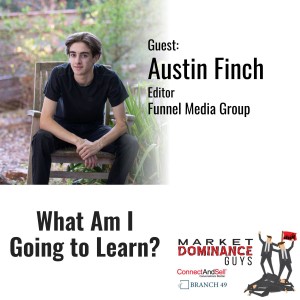
Tuesday Oct 18, 2022
EP152: What Am I Going to Learn?
Tuesday Oct 18, 2022
Tuesday Oct 18, 2022
Most people look at a potential job from the standpoint of “What am I going to earn?” Austin Finch, Funnel Media Group’s podcast editor and today’s guest on Market Dominance Guys, talks with our host, Chris Beall, about an additional and very important way of looking at any new employment you’re considering. They suggest asking yourself the question, “What am I going to learn?” Austin cautions job hunters that even a high-paying job can be a dead-end job. When you’re looking at a new job — whether it’s in sales or another field — Austin suggests that “If you can gain experience, and move on to gain more, then there’s no reason to hold yourself back.” Listen to the whole podcast for more words of career wisdom from Chris and Austin in today’s insightful and helpful Market Dominance Guys’ episode, “What Am I Going to Learn?”
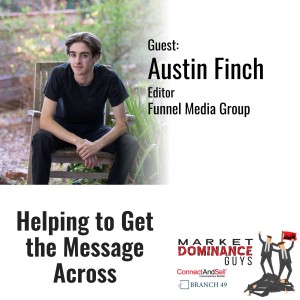
Wednesday Oct 12, 2022
EP151: Helping to Get the Message Across
Wednesday Oct 12, 2022
Wednesday Oct 12, 2022
Who’s behind the curtain making the Market Dominance Guys the great podcast that it is? It’s Austin Finch, an editor at Funnel Media Group, which produces Market Dominance Guys. In listening to this conversation between Austin and our host, Chris Beall, you would never know that Austin is the youngest guest ever interviewed for this podcast. Currently 17 years old, he has edited Market Dominance Guys for several years and has recently added Helen Fanucci’s “Love Your Team” podcast to his editing responsibilities. In talking with this intelligent, thoughtful, and insightful young man, Chris asks about the challenges of podcast editing, including the pruning and grafting necessary to increase a podcast audience’s understanding and to decrease the distractibility caused by any audio glitches or guests’ faux pas. Austin loves his job and sees his editing work as that of a translator for the hosts’ and guests’ messages, and his goal as “Helping to Get the Message Across,” which just happens to be the title of today’s Market Dominance Guys’ episode.
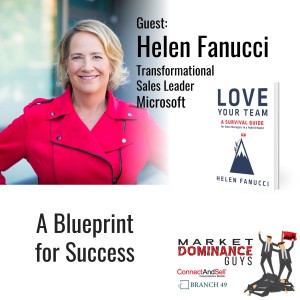
Wednesday Oct 05, 2022
EP150: A Blueprint for Success
Wednesday Oct 05, 2022
Wednesday Oct 05, 2022
Retaining your top talent and delivering results is a challenge for all sales leaders when your top talent can walk out the door without taking a single step.
The hybrid work revolution has made sales management the most pivotal role in the innovation economy—and simultaneously the most challenging. Our guest today is Helen Fanucci, Transformational Sales Leader at Microsoft, with 25 years managing hybrid teams and has an in-depth understanding of the problems facing sales managers today. Our Market Dominance Guys’ host, Chris Beall, conducts this second interview in his two-part conversation with Helen about her new book, Love Your Team: A Survival Guide for Sales Managers in a Hybrid World. In this podcast and in Helen’s book are details on not only what sales managers must be doing to thrive, but how to do them. It’s definitely a quintessential guide — with all the steps you need to know. But it’s even more than that as the title of today’s Market Dominance Guys episode states, it’s “A Blueprint for Success.”
About Our Guest
Helen Fanucci, Transformational Sales Leader at Microsoft is the author of Love Your Team: A Survival Guide for Sales Managers in a Hybrid World, available November 1, 2022.
Full episode transcript below:
(00:21):
Retaining your top talent and delivering results is a challenge for all sales leaders, when your top talent can walk out the door without taking a single step. The hybrid work revolution has made sales management the most pivotal role in today's innovation economy, and simultaneously the most challenging. Our guest today is Helen Fanucci, transformational sales leader at Microsoft, and has 25 years managing hybrid teams and an in-depth understanding of the problems facing sales managers today. Our Market Dominance Guys host, Chris Beall, conducts this second interview in his two-part conversation with Helen about her new book, Love Your Team: A Survival Guide for Sales Managers in a Hybrid World. In this podcast and in Helen's book are details on not only what sales managers must be doing to thrive, but how to do them. It's definitely a quintessential guide with all the steps you need to know, but it's even more than that. As the title of today's Market Dominance Guys episode states, it's a blueprint for success.
Chris Beall (01:25):
You have a team this big, you're going to have this much time spent on these one-on-ones, this much on these. These are the ones that have a fixed agenda. These are the ones that are event-driven, but they're probably going to flow at about this rate. Here's the blah, blah, blah. It's on and on. I mean, it's like an engineering breakdown. And folks, by the way, when you read this book, what you're going to get is love as both an emotional concept but also as an engineering concept. Love your team is something you do, not something you just feel. It's mostly something you do through these one-on-one conversations. There must have been a time in your career where you were going through the evolution of all this and you have all the pressures of regular sales managers, report this, blah, blah, blah, all this stuff, right?
Helen Fanucci (02:13):
Sure. Yeah.
Chris Beall (02:14):
Did you have to go through a transition or were you just like, "No, I'm always going to do it like this. Screw all you people"? Because I think for most people in the audience who want to do this, what they're going to do is they're going to read the book, then they're going to try to apply, say, some of the conversations of connection. I believe they'll probably start there because they're early and they'll notice that they didn't do one to introduce themselves to the team. And you have a great story about somebody quitting because she went to a group and never got engaged with by the audience. But you do have to go through a process of, "Gosh, I got to figure out this time management thing because that's the real constraint." Or is it just like, "I'm Helen Fanucci. I made my way through MIT. I must be able to manage my time"?
Helen Fanucci (02:58):
I had to think about time constraint, for sure. So, I used to do hour-long one-on-ones with my team. This was years ago. And somehow I thought that that's what was needed and maybe at the time that's what was needed. But I do a half-hour, actually 25 minutes now, and this is a new thing since COVID in the last 18 months is going from a half-hour conversation to 25 minutes. Because everybody's back to back and everybody needs at least a five minute break between a 30 minute or 25 minute conversation. So, I do that. Now, the other thing is I'm available on IM. So, one of the things that I talk about actually in the book in the first getting to know your team is how to communicate with me. People IM me or they'll text me, and so I'm also available for drive-by connection points in between our biweekly one-on-one.
(04:01):
So, I do biweekly one-on-ones with direct reports. And so my last team was 12 direct reports. I now have two managers that work for me and then about 30 people in my organization currently. And so I will do quarterly connections or things like that and sometimes more frequently with some of my skip level reports, people who report to the managers that report to me. And then of course, and separate from the one-on-ones, are the formal pipeline reviews. It depends on what is going on. So, it will happen twice a month if there's a hot deal happening and there's a lot of different moving parts or actions needed. It will for sure happen at least once a month. So, there are different requirements for forecasting in different organizations. So, I definitely pay attention to that and do the forecast reviews with my team so that I can be prepared when I need to report out and up to my management.
(05:10):
And one of the things I really emphasize, speaking of forecasting, is delivering three to 5% of the forecast. I don't value diving catches and last-minute deals in a way that maybe traditional sales managers might. Like, "Rah-rah, that is fantastic." Well, what that meant is it's a missed opportunity for us to get additional investments in our business if we didn't forecast that revenue. Because our investments in our business are directly tied to the anticipated and forecasted revenue. So, if we're under-forecasting all the time, we are missing out on a whole bunch of opportunity to actually increase our value to our customers and get more headcount and investments for our team.
Chris Beall (05:58):
I remember reading that in the book and going, "Oh yeah, that's right." As the guy who's on the other side making those investments, if the forecast is sandbagged, it's off, it's short, it's light just to look good, then it's like, "Well, how much are we going to put as a company into achieving that number?" If you take the thought experiment, you tell me you're going to make nothing, what am I going to invest in you? Well, nothing. I got to find somebody else to do the job. I want to switch up a little bit to you experiencing... You didn't just write a book, you actually do it. I've watched you do it now for, I guess, three years. And I've always been kind of surprised.
(06:38):
It's like sales management to me, when I've seen a lot of it, is, "Yeah, I put somebody in a territory, try to get a good rep, put them in a territory, hope they work out, tell them war stories about how great you were back in the day. Fire them if it doesn't work out and they go to club if it does." It's kind of like that's sales management. You have this very systematic step-by-step process or repeatable cycles within the process with these 17 conversations. My guess is that of the 17 conversations, one kind of conversation is the favorite, the one you look forward to it. If it's the first on the calendar in the morning, you get up a little bit earlier and are hyped up for it and ready to go, and you don't want any distractions and away you go.
(07:25):
And then there's always one kind of thing that you know you got to do, but it's not your fave. It's just it's there and you got to make sure you do it and do it well. But it's not the one that you... And I know you. You're going to do both of them. But what is your favorite? The one that really gets you jazzed. You've looked back on it, maybe you want to talk about it over dinner and wine in the evening. And then what's the, you got to do it, it's really important, but I don't love it that much?
Helen Fanucci (07:54):
Okay. So, I'll start with the second first. I don't love performance improvement, performance management conversations. What's so critical to any role, but particularly when your employees are remote, is you set clear performance-based expectations, outcome-based expectations, not activity expectations. And so what that means is obviously there's quota achievement required, but also for my team it is building stronger, deeper relationships with customers. So, I do a whole list of, if you will, hard expectations, hard numbers that are quantifiable, 3x pipelines, things like that, and then soft, like building a stronger relationship with your customer and increasing the executive engagement with a customer and things like that. So, when my team members, if they're falling short of performance expectations, I address that head on, I talk to them, and then they're on a performance improvement plan of some sort. I don't love that at all. So, that's my least favorite.
(09:15):
So, now that we have that out of the way, let me go to my most favorite, and that is account strategy and ideation and sales strategy. And I love talking with my team about that, brainstorming the next action. So, they'll bring to me a situation, it could be a customer situation, maybe a customer executive left and they're trying to figure out how to get in to see somebody else or the replacement, and so we talk about, "Okay, who knows who and how do we navigate and do we need to bring in one of our executives as bait in the bucket to get this executive to come and meet with us?" So, I love account strategy ideation. That's my favorite part. And a lot of it is asking questions to really understand what's going on and what is needed so that I can be helpful.
(10:16):
Because sometimes what's presented to me, it sounds like we need to have a discount or an investment, but as you get into it it could be that there could be a miscommunication with the customer. It could be that there are things that we need to do to make sure we really understand their business sufficiently that we can present the best solution for them. And maybe it gets redirected to a different offering or a different tactic, if you will, to keep the business moving forward, deal at hand moving forward. So, I love the strategy part of it the most.
Chris Beall (11:01):
Sounds like fun for me too. I really think that that part of business is always fun. When you're ideating, you're brainstorming, you're trying to figure it out. And also it's got to be fun when those action plans are put together and they're progressing to have those one-on-ones that determine, "So, how's it going? And are we achieving what we... We took a guess. We did a thing. Now what?" That's got to be fun too.
Helen Fanucci (12:06):
Yeah, it is, for sure. Yep. You bet.
Chris Beall (12:12):
Yeah. So, Love Your Team is directed at an audience of sales managers. It says so right in the subtitle. A Survival Guide for Sales Managers. Now, I suspect that your way of looking at the world and the techniques and that structure of having these important conversations probably is applicable to all management. But you're not going to go crazy and just say that's it. So, let's think of your audience as sales managers for a moment. As you think about that audience and you think back on writing the book, were there any of those conversations you thought, "This ain't the 100 level course, this ain't the 200 level course. This is where your skills are really going to be challenged"? There's a lot on the line. You have a whole section on skills, on conversational skills, which I've never seen before in a book like this, that says, "These are the skills you need to hold these conversations."
(13:03):
So, there's the skills. We're all lacking in different skills and we all have strong in different skills. And then there's the conversations. And we've never talked about this before. I'm just curious. Did you ever get to the point of thinking, "Oh man, this is like 400-level course stuff that somebody is going to try it, but it's going to be hard for them to do it because the skills required are going to be in short supply"? Or did that not ever come up? Maybe it's like, "Yeah, yeah, everybody can do this."
Helen Fanucci (13:35):
Well, it never came up because what I intended to do with this book is reflect on what I think is needed for sales managers to be successful. And I will say, this is B2B enterprise sales. And so that's my world, and so it won't be applicable to everybody. And I'm not trying to convert people who don't want to be converted, but if folks think that they have a challenge retaining talent or they want some new ideas, I'm hopeful that the book is helpful for them. To be honest with you, I probably am not the best observer of myself. So, while these conversations may seem obvious to me and straightforward and I broke them down and intended to make them accessible and straightforward, I really don't know what the audience of sales managers reading the book, I really don't know where the struggle might be. And I'd be super curious to know that and how I could be more helpful. But I'm kind of blind there, to be honest with you. I don't know.
Chris Beall (14:49):
Yeah. It was probably smart to be blind there because it would be easy to overcook some of these sections if you think that they're too difficult or whatever. I found in my reading of the book, and for the audience, just so you know, in its various forms I've probably now read it nine times, maybe 10 times, not always deeply, but this is a confession. Normally I don't read any book twice. I'm a very fast reader. I love to read. I don't read twice. I get something out of Love Your Team every time I read it. And that's on top of a very, very long career. So, I think that there's a lot of depth and subtlety in your description of these conversations.
(15:32):
As I think them through, I think this way of looking at the world and then putting it into action of having these conversations as a means of getting action, a means of getting results, some of which are, I'll call it action results like deals, revenue, et cetera, but some of which are really, we'll call them valuation results, that as companies are worth more now when they have great talent on board. You lose talent and you lose value. You lose your future as a company. You lose the option value of being able to do things with great people that you can't really do with either not great people or while you're trying to find people.
(16:12):
So, I've read it a bunch of times, but I kept coming back to, "Gosh, I wonder whether people are going to be able to do this or not." And I've come to the conclusion they will be able to do it. I think you've broken it down to the point... Give an example out of, say, the first of the conversations of connection. What is an example of a level of detail that you've provided that somebody might think, "Why is she telling me to do this? Of course, I'm going to do that," but in fact you probably suspect without the detail they aren't going to do that or we aren't going to do that?
Helen Fanucci (16:46):
Introducing yourself to your team. I have three PowerPoint slides that I show. I talk about, the first slide is about me, what's my career background, my family situation. And in fact, I did this introduction to new team members this summer, and I put our wedding picture on it because that was current and timely and that was on that slide. And then a little bit about me. And also, what are my favorite things? Like what's my favorite thing to eat or drink? And so my favorite thing to eat is anything somebody else cooks. So, I'm lucky that Chris likes to cook, and every meal that he cooks is my favorite meal. And then what I like to drink and things like that. So, just fun facts or things I like to do, hobbies or skiing or things like that. So, that's the first slide.
(17:44):
The second slide is my leadership approach and philosophy. I list out the things that are on that slide, like culture first and people first, results-oriented, clarity of results and expectations, no surprises, if there's bad news, communicate it early, things like that. And then the last slide is what's next? So, I make it clear that I'm going to set up one-on-ones with each of them and they don't need to come prepared. It's really just to get to know them. And I also talk about how to communicate with me. So, as I mentioned, IM and texting works great. And so that's what I put on the three slides. So, it's really short and sweet. And for my last team of 12 people, I had each of them introduce theirselves briefly and tell me a fun fact of themselves, like where they like to travel or something like that.
(18:49):
My current team of 30, I did not have everyone introduce themselves but I followed up in over a two or three week period. I met with each of them, all 30 of them, even those that report to my managers. I met each of them for 30 minutes, had a one-on-one with each of them. So, that's the level of specificity and detail in why I do it. And it may or may not work for the reader to be that specific, or maybe they haven't reflected on what their leadership approach or style is and what they care about. So, it's an opportunity for them to reflect on that. So, getting back to your last question as you were then talking, I thought about what might be tough for the reader. And I think what might be tough is the orientation to think about their team first, if that's not how they've been doing their role to date.
(19:50):
So, for example, I think about servant leadership. How can I amplify my team's success? And so when my team members are presenting to the deal review board to try to get a discount or investment or resources for their customer, I ask them, "Would it be useful if I take notes in the background so you can stay present in the conversation and your presentation?" And they all take me up on it. So, I will be off camera. I will take notes and including actions, and then I send it to them after the meeting and the call. And I think it might be tempting for sales leaders to be the ones that are doing the presentation in front of the top ranking executive in the company and the finance team and having that visibility.
(20:49):
Many sales leaders want that for themselves. I want to amplify my team and I want to help my team learn and grow. So, I'm in the background. And that might seem weird to some of the folks who are listening to this podcast or reading the book. And so it might not be everyone's cup of tea, but I'm authentically telling them how I do it for their consideration.
Chris Beall (21:17):
I love that thing where you take notes, and it's not so you can keep tabs on them or whatever. It's so the person who's reporting to you or reporting to the person reporting to you can focus on what they're doing and their internal presentation, say as the example you gave, and do a great job and be exposed. I really like the fact that... This one, I think everybody should think about. If you really love your team, you're going to help them get positive exposure for what they're doing, not just in the number, but in every day or as life is going on to the senior executives. And it might result in somebody wanting to pluck them out of your team and put them somewhere else. And that's okay. If that's what they want to do, if that's good for them, that's your job to help them and support them in that. I think that is the hardest reorientation for folks probably is, even if it means that that exposure or that help, that support, whatever you're giving them is going to let them go get another job, so to speak, that's still your job.
Helen Fanucci (22:23):
Yeah, for sure. I do have explicit career conversations with team members and my recommendations. That happens at least twice a year. Sometimes if there's a lot going on we'll talk more frequently. But my team that I just referenced, a team of 12 sellers, three of them now have management roles within Microsoft. So, the three of them I was involved in coaching. They shadowed me in some cases. And so I absolutely think it's a win and it's a success. If your team's not learning and growing, they're going to leave. And actually the data supports that as well. It's fundamental to what folks care about is that they learn and grow. And so I support that. And yes, it means I have to backfill them and hopefully they stay at my current company, which is Microsoft. And if for whatever reason they decide that Microsoft isn't serving their career anymore, well okay, that's okay too. But it's really success on their terms, not my terms that I aim to support.
Chris Beall (23:43):
I think that's such a big, big message and a big change between the Love Your Team approach and the standard approach. If we were just to boil it down to the one thing, it's their north star becomes your north star. And it's individual. It's one-on-one. And I think that's a radical big idea that to some people might sound soft or it might sound dangerous, like, "Oh my God." But your view is it's actually the safe route in a sense, right? It may sound different, but you're reliant on them anyway. You're already in the boat with them.
Helen Fanucci (24:17):
Here's the thing is, I need to model the behavior I want to see in them. So, I expect my team to work well across the organization with their peers and building trust and building relationships is foundational for me with my team, but it's also foundational for them with their customers. And so understanding what constitutes success for customers on their terms is critical for us to be able to deliver value and make sure that whatever we're selling actually meets their needs so they get to say so. So, it kind of goes downhill, so to speak, or it's a virtuous cycle where we all win if the customers are successful in getting what they want in return. And so it's, I'm modeling the behavior I expect to see in my sellers as well.
Chris Beall (25:16):
Well, on that note, I guess we've finally come full circle all the way around to what the other 140-something episodes are about, which is having trust-based conversations with customers, which in the Love Your Team system actually happens more easily and more naturally because what's happening on the inside is then happening on the outside. Helen, you and I have run out of time for this podcast. Thank God we haven't run out of time for each other. And on that, I'm going to say, Corey, we miss you. We love you. But Helen and I had a really good time making this one today.
(25:52):
I am so pleased that you could be on today, Helen. Your book again, Love Your Team: A Survival Guide for Sales Managers in a Hybrid World. It's out November 1st. This podcast will drop a little sooner than that. Everybody who's watching this, listening to it, doing whatever you're doing with it, mark it in your calendar November 1st, and if you're really smart, reach out to Helen and see God knows what, LinkedIn or whatever. She might actually do something special for you in the book department. I really don't know, but it's going to be an incredible experience for you. Thank you so much, Helen.
Helen Fanucci (26:28):
Thank you, Chris.
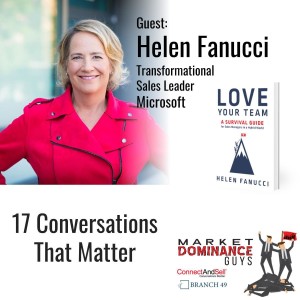
Wednesday Sep 28, 2022
EP149: 17 Conversations That Matter
Wednesday Sep 28, 2022
Wednesday Sep 28, 2022
In this scary new world of employment, where top sales talent has the power to stay with your team or leave you in the lurch, how do you hold onto that top talent? Helen Fanucci, Transformational Sales Leader at Microsoft and our guest on Market Dominance Guys, knows the answer to this question — and that answer has 17 parts. Helen has taken her 25 years of experience managing remote teams and turned that knowledge into a ground-breaking book titled, Love Your Team: A Survival Guide for Sales Managers in a Hybrid World (available on Amazon Nov. 1, 2022). In it, Helen details the 17 conversations that sales leaders must master with their team to successfully attract and retain top talent. Our podcast host, Chris Beall, questions Helen about her tried-and-true theories on why putting your sales team members first will get you the results you’re expecting. Get ready to take notes about this brave new approach to managing sales teams in today’s Market Dominance Guys’ episode, “17 Conversations That Matter.”
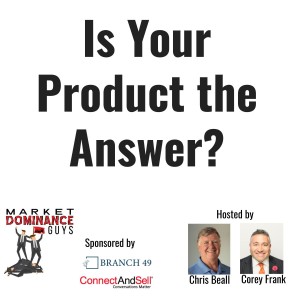
Tuesday Sep 20, 2022
EP148: Is Your Product the Answer?
Tuesday Sep 20, 2022
Tuesday Sep 20, 2022
What’s your Big Idea? And does your Big Idea solve your prospect’s Big Problem? Exploring this important aspect of a discovery call today are Chris Beall and Corey Frank. As Chris explains it, at the beginning of a discovery call, you don’t really know what problem your prospect is facing. And because prospects are generally reluctant to confess their companies’ issues and concerns to strangers, it’s often tough for you to determine whether this is a call that will lead to the next step in the sales process — or will lead nowhere. You can nudge a prospect toward the confessional with a few probing questions, but you can’t necessarily get them to sit down in the booth and open up. So, how do you find out if your product or service is a good match for their needs or wants? Listen in as Corey and Chris teach you how to subtly and expertly steer your prospect away from their initial apprehension of talking to a stranger all the way to the moment when they finally feel safe enough to divulge the information you’re seeking. Then, and only then, will you know if your product will truly solve their problem. As always, our two sales experts offer lots of helpful advice on today’s Market Dominance Guys’ episode, “Is Your Product the Answer?”
Full episode transcript below:
(00:22):
What's your big idea and does your big idea solve your prospect's big problem? Exploring this important aspect of a Discovery call today are Chris Beal and Corey Frank. As Chris explains it at the beginning of a Discovery call, you don't really know what problem your prospect is facing. And because prospects are generally reluctant to confess their company's issues and concerns to strangers, it's often tough for you to determine whether this is a call that will lead to the next step in the sales process, or will it lead nowhere. You can nudge your prospect toward the confessional with a few probing questions, but you can't necessarily get them to sit down in the booth and open up. So, how do you find out if your product or service is a good match for their needs or wants? Listen in as Corey and Chris teach you how to subtly and expertly steer your prospect away from their initial apprehension of talking to a stranger all the way to the moment when they finally feel safe enough to divulge the information you are seeking.
(01:20):
Then, and only then, will you know if your product will truly solve their problem. As always, our two sales experts offer lots of helpful advice on today's Market Dominance Guys episode, is your product the answer?
Corey (01:37):
How do we unplug? I think we started this conversation, is it possible to rewire the brain from the way that we do Discovery and our good friend, Oren Klaff, talks about the way that we learn things chronologically from our bad bosses, from bad behaviors, from trying to wing it, is the way that we run them or that we talk about. And so I think you and I earlier were talking about the alphabet, ABCDEFG. If I asked you to go to K and then tell me the alphabet backwards, well, maybe you could, but most people couldn't do it because you didn't learn the information that way. And so usually folks, again, are learning about Discovery from who's sitting next to them, maybe their own persona, maybe how they were pitched themself on a product. And so they need to gravitate to the right way of understanding the emotional state, from what I hear you're saying, to help us rewire.
(02:42):
And we rewire this natural, what we think is a natural order of doing things, otherwise, we're going to constantly keep fighting this inclination to do it the wrong way all the time. And in the process, I think that what I hear you saying, Chris, is that what we're trying to reconstruct is how the buyer really cares about things, how the buyer really sees things. They don't care about how we learn about it. They don't care how we think about it. They don't care what our quota is. They don't care how we do our business. They don't care how we get our business. They only care about the information that they need to know in the order that they need to know it.
Chris (03:23):
And they need to be motivated to learn, which is hard, right? Folks are motivated to learn about stuff that might solve a problem that they have right now. And this actually is similar to the cold calling, how do you get trust? Well, you show the other person that you see the world through their eyes, tactical empathy, and then you demonstrate to them that you're competent to solve a problem they have right now. The problem in discovery is we don't know what their problem is that they have right now. So how are we going to allow them or get them to be comfortable exposing it? Nobody likes to talk about the big problem that they have right now. That's vulnerability just like, here doctor, before we get started, I'd like to cut my chest open and show you this. It's like, no, I'm not there. So this rewiring is really hard and it's hard for emotional reasons on both sides. You have urgency on the part of the sales rep, you have apprehension on the part of the potential buyer or the prospect.
(04:25):
How do you get from there to a place where you're actually discussing the nature of their problem? The beauty is once you get there, you are an expert as the seller and the other party will get more and more comfortable telling you the details, the constraints, the importance of their problem as they realize that you are asking questions that are the questions they've been asking themselves about it. And as soon as that happens, then you're in this magic land. You're in the confessional. And you're both just mutually exploring the possibility that this is worth exploring further, because by the way, the POC ain't going to come out of that Discovery call, come on. There has to be some subsequent thinking and consideration that goes on. Even at ConnectAndSell, all we're seeking is a next step of let's just do something together. This test drive thing, let's have an experience together, but we're not having it in hopes of buying connect.
(05:25):
And so we're just having it because, frankly, our product's incomprehensible without having the experience, you may as well have the experience. We got there eight years ago and decided that that was an okay thing to be shooting for. It's a further discussion with action. It's like, oh, so you think that my approach to the golf swing might hold some promise. Well, would you like to go out and spend an hour and see what it's like? I'll take your left hand off the club, if you're right handed, and you're going to swing with so much weakness that you'll start producing good golf shots to your own surprise. It's that kind of thing. Is it worth that? You're not going to, mind you, I'm not a golf teacher. That's like being a lawyer without a license or something, but I have a theory. Well, if you like my theory, maybe you'd come out and experience it.
(06:11):
So it's such an interesting process because in the cold call we never really have a breakthrough. We have an agreement. We have a breakthrough we're bringing, but we have an agreement, a commitment that comes out in the end, but there's no breakthrough. In a Discovery call, we must have a breakthrough. And the breakthrough is into the confessional. And once we're in the confessional, as long as we are not trying to manipulate the situation, and this is the hardest part of sales. You really believe that you have a solution in certain circumstances that would really help somebody and would be worth their while to go down the road and spend somebody else's money. Remember, it's always somebody else's money. It's B2B. So they're spending their company's money or whatever it happens to be. So we really believe in this, but if we push for it and therefore our product is always the answer, we can't possibly be honestly exploring whether our product's the answer. It just doesn't make any sense. You have to be open to not being the answer in order to honestly explore whether you are the answer.
Corey (07:23):
Yeah, sure. I like that. I think that after that emotional state is accepted, validated and transitioned from that apprehension to pride. And, again, back to our friend, Orin, here on the concept of the big idea, or even with our friend, Brad at Sandler, the big idea from the Sandler Sales Training is they both say. Orin talks about this big idea is we have to then get the prospect to see that there's a raising of the stakes, there's consequences and outcomes. There's a fear of missing out. There's an opportunity, something is being taken away.
(08:05):
But that first step of raising the stakes to get them to open up a little bit in the confessional, because if there's no raising of the stakes, there's nothing to talk about. And if they see the stakes are perhaps being raised, then they may feel a little bit more open to say, okay, well, it sounds like you're an expert and maybe we can talk about this problem that I have to create this little intrigue. What do you think about that kind of concept of the next step after moving them to a point of pride and less off of the apprehension?
Chris (08:38):
I think it's huge. Oren talks about winter is coming as a way of framing something in the world as it is right now, this bad thing could be happening and cybersecurity where you guys do a lot of work, it's not very hard to imagine winter is coming. Winter is everywhere, but-
Corey (08:56):
It's nerdy and it's always here. Winter is always here.
Chris (08:58):
Exactly. So we've got to get to the point. In fact, you can look at it this way, you need to get to the point where you're comfortable enough with each other, that you can raise the stakes. Because if you raise the stakes too early, what you're going to get is just run away. They're just going to run away. It's like, so are you an expert? Are you on my side? Are you an expert and are you on my side? Well, it's easy to be an expert, and Orin teaches some great stuff about that. There were some things that happened on our honeymoon, by the way, doing our whiskey tastings in Ila where the flash roll that the [inaudible 00:09:35] talks about was so expertly done by this one young man, he was 19 years old and yet he's walking us to-
Corey (09:43):
And he just nailed it?
Chris (09:45):
And it was the pace, the comfort, the this is so routine for me and I'm thinking, wow, this is wild that they do this crazy stuff to make this crazy stuff. But if you drink it at 11 o'clock in the morning, you better be ready to, so the flash roll, great, establish you as an expert. It's a great thing to learn how to do. I think everybody should have a flash roll. And at ConnectAndSell we teach our reps that a very specific flash roll, they bring up our team today right now live, so you're seeing them live so there's some risk. There's no heightened tension because you're watching on the screen. You're seeing calls and the meetings being set and nobody knows what's going to happen. So a little uncertainty goes a long way right then. And then there's a description of how one of the reps on our team is doing today. Well, here's Steve and so far today he's used ConnectAndSell for two hours, 51 minutes and 17 seconds. And during that time, he's had 631 dials done for him.
(10:52):
And he's had 37 conversations. And he set four meetings and his goal today is 2.7 meetings. So he's probably feeling pretty good right about now. And it's like bah bah bah, only an expert would talk like that. It's not about teaching, it's about establishing yourself as an expert. And that's one of the main things I've taken away from Warren's work and put into my own repertoire is, remember you owe the other person a flash roll because they need to accept you as an expert. And the flash roll is not an attempt to teach them something, it's just to describe something in your world that you would not describe so casually, unless you were an expert.
Speaker 1 (11:34):
We'll be back in a moment, after a quick break. ConnectAndSell, welcome to the end of dialing as you know it. ConnectAndSell's patented technology loads your best sales folks up with eight to 10 times more live, qualified conversations every day. And when we say qualified, we're talking about really qualified like knowing what kind of cheese they like on their impossible Whopper kind of qualified. Learn more at connectandsell.com. And we're back with Corey and Chris.
Chris (12:15):
It's almost like a quick mathematical proof of your expertise in a way. This couldn't have happened. I can't have juggled four balls casually while talking to and taking my hand out and I don't know, petting a cat or something like that, unless I knew something about juggling. So that part is, I think you establish yourself as an expert and experts know things about the world. You go to the dermatologist when they're looking at your body top to bottom, as they will do with us, the older we get and the more we grow up in Arizona, and they're going barnacle, barnacle, barnacle hmm. That hmm you accept. Then the dermatologist says, Hmm, that's like, whoa, my ear's perfect, what do you mean hmm doctor? And I think we might need to biopsy this or two whatever, and we accept it because it's an expert who's on our side.
Corey (13:16):
We certainly are wired to accept experts perspective. And tonality has a lot to do with that. Listening has a lot to do with that. Certainly empathy, as you've talked a lot about, has a lot to do with that. The big idea is attractive enough and it's compelling enough, it's intriguing enough. If it's building enough tension, it elicits the emotion and the prospect that, oh, I'm in the hands of an expert. I should probably sit back and listen to them, examine all the different moles that I have on my body.
Chris (13:54):
Is that a barnacle or is it something more interesting?
Corey (13:59):
And we could finish it. We could talk all day about Discovery. I love picking your brain on this is that runner think it was, is two modes of narrative. You have narrative, straight narrative and then you have paradigmatic. Orin calls them hot cognition and cold cognition. And the paradigmatic mode is the mode of science and it's concerned with logically categorizing the world analysis, cold stuff. The narrative is about building meaning and describing human experiences through those stories. And these stories are human-like or intention with action, like the flash roll at the 19 year old in Edinborough, or the story with the ferry that you told me in Iceland before this, they capture people's explanations about what they want to do and how they'll go about achieving it, painting the picture of the future.
(14:47):
And so I think we have to be on guard of if we put people too much, because we're so happy about our product, in the paradigmatic mode, in logical, mathematical, analytical modes, they eventually grind on us. Bruner's argument was that if we stay too long in paradigmatic cold cognition world, they're going to constantly be testing the things we're saying for truth and falsehood and mathematical correctness. And they won't become interested in us as real characters and believe that we're honest and truthful and aspiring, and we're on the other side of this big swirling blue orb and they'll constantly be questioning and trying to trip us up. So what are your thoughts about that? Because we both sell very technical products and we work with clients that sell very technical products. And sometimes in the Discovery process, we can go a little bit too one way on the cold speeds feeds paradigmatic mode and that pushes us away from their trust in a lot of ways.
Chris (15:54):
I think that's a big deal. It's very tempting to go for the paradigmatic stuff because it's ballistic. I say this, I say this, I say this, I say this. I say this. It is like reciting the alphabet. And I might think that I'm still flash rolling but at that point, I'm not. I'm not establishing myself as an expert. I'm establishing myself as a boring pedant who has got to be ignored sometime soon. And I'm also establishing myself as somebody who is tiresome to listen to. It's very difficult for most of us to do analytic work, analytic work is physically exhausting and some people can do more of it than others. And so take an example, I don't know if a puzzle, like a Sudoku puzzle, when you first approach it, it seems easy. And then you get this stuck feeling, and what that is is you've actually run out of analytic juice and if you put it away and come back, after two hours or whatever, you'll immediately be able to make the next-
Corey (17:00):
You've run out of analytical juice. That's one for the ages, Chris, I love that.
Chris (17:07):
And I'm an analyst by nature. I have people who have worked with me in these other ways know that I am annoyingly analytical. I spent two hours this morning buried in some spreadsheet in which I was trying to predict how much ARR would come out of a new product, blah, blah, blah, blah, blah. And I'm pretty comfortable with that but I recognize there's a point where I'm no longer too tired of that kind of thinking. When it's coming out of me, I have a lot more juice. When it's coming into me, somebody's asking me to go along with their analysis, then I have this other problem. And the other problem is I have to keep up with the analysis and defend myself against conclusions that might not be in my interest and that's exhausting. So the questioning that goes on in that the description that goes on paradigmatic description that goes on in a lot of Discovery calls is physically exhausting for the listener often. And if that happens, they don't tell you that they've turned off, but they're no longer hearing you.
(18:18):
It's that cartoon where the dog is just hearing their name, blah, blah, blah, blah, Ginger, blah, blah, blah, blah, blah. Very famous cartoon. We're like that. And it doesn't matter how good we are at analysis, we're like that. We have more juice when we're analyzing something where there's nothing at stake other than say getting to an outcome. I used to teach something, the audience probably isn't aware of this, but I developed the Unix and the C curriculum for bell laboratories back in the early 1980s. And I taught it to establish that the curriculum was usable. I taught it to admins, to secretaries. I taught them how to program in the C programming language for those of you who, but it is still being used today, actually oddly enough, and how to use the Unix operating system, because that's what they had. That was the desktop at the time for very advanced companies.
(19:21):
And what I learned very quickly was in the best case in a one hour session, they could learn three things. And those three things had to be taught in three 15 minute pieces with a break in between them to recover, doing something else that had nothing to do with the physical exhaustion of trying to learn how a pointer works or whatever it happens to be. We had huge success, but I had no success when I went to four. So I couldn't teach four things in an hour, but I could easily teach three in an hour, but that doesn't mean three close to each other. And the key was always to get the affect of the class, the emotions of the class together at the same moment. So the hard bit, there's always a sticking point in understanding anything, there's an aha hiding in there somewhere, could be something that most of the class had experience and then it would give them something to talk about and we'd do a little exercise later.
Corey (20:19):
So that's the analytical juice running out as well as the example you gave of the Sudoku puzzle as well. Very interesting.
Chris (20:27):
We don't sell a great deal of analytical juice, trust me. It's really funny. Our brains were evolved to move our bodies and they were not evolved to think about stuff.
Corey (20:43):
So that's why an ideal Discovery is probably in that 20 to 25 minutes max range or so before you've got to do use both a favor and pull up stakes and continue the conversation another time.
Chris (20:59):
Exactly. And that's why I like starting them slow. No urgency. If this turns out to be important, it will turn out to have been worthwhile, to have started in a way that took a little bit more time. If it turns out to be unimportant, then nothing was at stake. So why are we worried? You could have had no meeting at all.
Corey (21:21):
Well, Chris, this is great here. See all that pent up wisdom from all that scotch that you consumed in the Shortlands, and Ed and Earl, et cetera, does have a purpose. We transferred all that to energy that will help all of us on the Discovery call. I'd like to do this again. As we had talked earlier, we need to bring in a guest expert for Discovery so we can run us a couple of things and folks who are doing it in the wild and we can chat about them. But until next time, Chris, any final thoughts on Discovery here?
Chris (21:53):
Well, it's one of those rare things where the name of that holds the key. We go out seeking to discover, we're curious and open minded. And if we can maintain that mindset and then learn how to help somebody else along so that they can afford to be curious. We come in curious, we have to help somebody else afford to be curious. Make it safe for them to be curious then we can discover amazing things. And that's, in my experience, where the big deals come from. I've got in my deep past, a little bit of big deal history, the hundred million deal. And those deals when I go back and deconstruct them and reconstruct them, they had these characteristics. So the slow at the beginning, the patience. I was telling somebody a story about a particular company where I went and sat in their lunchroom for two hours each day for two months and just listened and talked to people. And that led to a deal that had a lot of zeros and commas and stuff like that.
(23:01):
And yet when it finally happened and I went back and thought, did I waste my time sitting there talking to people? The answer was, no. It took that slowness in order to get to that certainty where we could actually explore together.
Corey (23:14):
Yeah. Oh, for sure. Yeah. We have to hear about the hundred million sale, a dollar sale one of these days too. So it's great to have you back, Chris, the post honeymoon edition of the Market Dominance Guys for Chris Beal, this is Corey Frank.
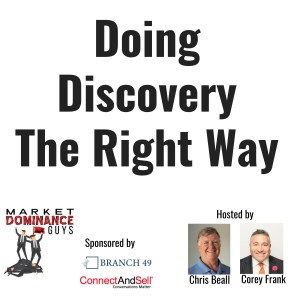
Tuesday Sep 13, 2022
EP147: Doing Discovery the Right Way
Tuesday Sep 13, 2022
Tuesday Sep 13, 2022
What are the best practices for conducting a successful discovery conversation? And how do those practices differ from having a successful cold call? On today’s Market Dominance Guys’ podcast, our hosts, Corey Frank and Chris Beall, share their insights into these two distinctly different types of sales conversations. They talk about tone, about call length, and about the practiced performance of a cold call, which has the goal of setting an appointment, versus the slower-paced, getting-to-know-you interchange of information, which has the goal of answering the question, “Does it make sense — to both parties — to proceed further?” Stay tuned to hear the advice and cautions of these two sales experts on today’s Market Dominance Guys’ episode, “Doing Discovery the Right Way.”
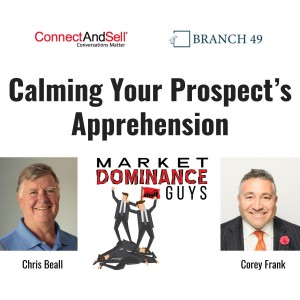
Wednesday Sep 07, 2022
EP146: Calming Your Prospect’s Apprehension
Wednesday Sep 07, 2022
Wednesday Sep 07, 2022
"Every discovery call begins with apprehension,” says Chris Beall, our Market Dominance Guys’ co-host, who is back behind the microphone after a two-month absence. Chris goes on to say that you need to be aware that starting a discovery call by interrogating your prospect only increases their apprehension. If you’re going to have a meaningful, successful conversation, you need to use a kinder, gentler approach. Chris talks with his co-host, Corey Frank, about a couple of ways he knows to take a prospect from that feeling of apprehension and fear to a feeling of pride and openness. Then, and only then, will the atmosphere of the call be right for you to ease the conversation into one of mutual discovery, where you and your prospect can learn whether their company is a fit for your product. As the title of today’s Market Dominance Guys’ podcast states, this can only happen once you’ve succeeded in “Calming Your Prospect’s Apprehension."
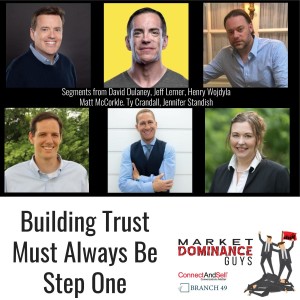
Wednesday Aug 24, 2022
EP145: Building Trust Must Always Be Step One
Wednesday Aug 24, 2022
Wednesday Aug 24, 2022
In this episode of the Market Dominance Guys, Corey and Chris agree on the importance of building trust before anything else can happen. They are joined by Transformational Coach Jennifer Standish, Henry Wojdyla, Founder and Principal at RealSource Group, Matt McCorkle, Manager of Branch Operations at Kaiser Compressors, and hosts Ty Crandall on the Business Credit and Finance Show, Jeff Lerner from Ep 150 of Millionaire Secrets, and David Dulaney on the Sales Development Podcast. The full episodes to the ones included here are listed below:
EP91: Borrowing from the Best
EP109: Being There for Your Customers
EP123: Hire Yourself a Grandma
The Business Credit and Financing Show
Sales Development Podcast https://www.spreaker.com/user/9196584/episode-164-done
MILLIONAIRE SECRET #150 Unlock Your Potential with Jeff Lerner
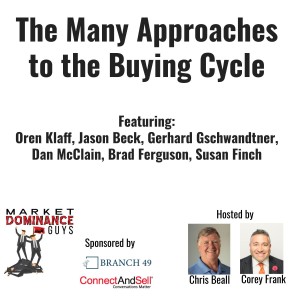
Wednesday Aug 17, 2022
EP144: The Many Approaches to the Buying Cycle
Wednesday Aug 17, 2022
Wednesday Aug 17, 2022
These sales experts agree, that there is more than one approach to a successful sales campaign. We're sure Chris Beall has some dark childhood story about alternate ways of skinning a cat, although he's never done it, of course. These discussions include modifications and redirections in the buying cycle, even though the basics are still there: awareness, consideration and decision. Join Corey and Chris in this episode of snippets from episodes about the buying cycle. This features Oren Klaff, Jason Beck, Gerhard Gschwandtner, Susan Finch, Dan McClain, Brad Ferguson, and our own Chris Beall and Corey Frank. To hear the entire episodes features, visit this collection:
https://marketdominanceguys.com/category/buying-cycle/
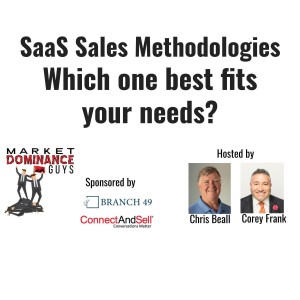
Wednesday Aug 10, 2022
EP143: SaaS Sales Methodologies - which one best fits your needs?
Wednesday Aug 10, 2022
Wednesday Aug 10, 2022
Sales methodologies are the practical, how-to “guides” that support a sales process. These actions serve as a bridge between each step of the sales cycle by keeping both the buyer's and prospect's demands in mind. In our recent episodes with Brad Ferguson, Corey and Brad discussed the Sandler method vs. Oren Klaff's Pitch method. In this quick comparison segment, Corey explains the difference between the two methods, and when one fits better than the other. What is your method to determine which sales methodology fits your company? Have you bothered to determine which to use, or are you even using one method? That's a great place to start. Corey Frank is an expert at taking companies through this process - he's done it dozens of times. Welcome to this episode of Market Dominance Guys, "SaaS Sales Methodologies - which one best fits your needs?"
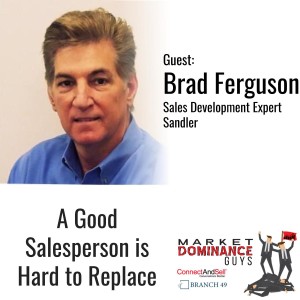
Tuesday Aug 02, 2022
EP142: A Good Salesperson Is Hard to Replace
Tuesday Aug 02, 2022
Tuesday Aug 02, 2022
Getting fired from a sales job is never a surprise. If you’re not producing, you already know it. Brad Ferguson, the managing member of Scottsdale Sales Training, has been with Sandler Training for more than 27 years, and today he shares his sales hiring, onboarding, training, and coaching expertise with our podcast host, Corey Frank. Brad believes that before you let someone go from a sales job, you need to determine whether this person can sell, and you need to consider your company’s financial investment in that individual. This includes training, coaching, and certifying, as well as their salary and benefits. Brad cautions our listeners, “Don’t let the good people you have go. Spend the time getting them up to a higher level.” If they are worth keeping, make the effort to diagnose their problems and then provide the needed training, because, as the title of this Market Dominance Guys’ episode reminds us, “A Good Salesperson Is Hard to Replace.”
About Our GuestBrad Ferguson is the CEO of Best Sales Force, Inc., an Arizona-based sales development firm. He is the Senior Sandler Training Franchisee with over 25 years of experience in the Sandler Network.
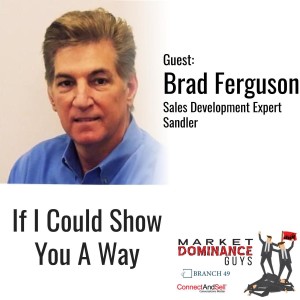
Wednesday Jul 27, 2022
EP141: If I Could Show You a Way
Wednesday Jul 27, 2022
Wednesday Jul 27, 2022
In this continued “honeymoon” edition of the Market Dominance Guys, our host, Corey Frank, sits down with Brad Ferguson of Sandler Training, one of the most highly rated sales trainers on the planet. Brad, being a top franchisee of Sandler for years, personally learned his incredible questioning techniques and prospect approaches from the founder of Sandler himself, David Sandler, more than 30 years ago.
On several of the Market Dominance Guys' podcasts over the years, Chris Beall and Corey have discussed many of the modern and fresh sales methodologies being used by successful sales professionals all over the world. From Oren Klaff’s “Pitch Anything” to Andy Paul’s “Sell Without Selling Out” to Chris Voss’ “Never Split The Difference,” there are many different flavors of sales methodologies that can be used to generate trust that result in more consistent sales success.
If you’re a pilot, you file a solid flight plan and know where you are going before you start the engines. You may change course due to bumpy weather, but you still know your final destination. If you are an architect, you know what type of building you are constructing. You have a blueprint. But if you are in sales today and you are still “winging it” and letting your personality alone dictate how your sales conversations progress, you fall into the trap of being labeled a “mere tourist” and continuing to wander inconsistently in this profession. As Uncle Zig once said, “Selling is the highest-paid hard work and the lowest-paid easy work there is.” Using a sales methodology makes the hard work easier.
In this episode, have your pen and pad ready as Brad shares several tactical and specific use cases where the Sandler methodology can be employed on your calls today. He discusses many traditional “mental hang-ups” and speed bumps that impede success from an emotional point of view. From being uncomfortable about money to having a high need for approval and an aversion to the word “no,” Brad shares just some of the powerful Sandler techniques that have generated hundreds of millions of dollars in closed deals. This is the Market Dominance Guys' nearly indispensable podcast, and today’s episode is entitled, “If I Could Show You a Way.”
About Our GuestBrad Ferguson is the CEO of Best Sales Force, Inc., an Arizona-based sales development firm. Heis the Senior Sandler Training Franchisee with over 25 years of experience in the SandlerNetwork.
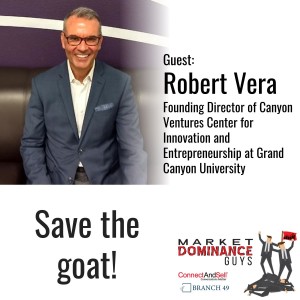
Wednesday Jul 13, 2022
EP140: Save the Goat!
Wednesday Jul 13, 2022
Wednesday Jul 13, 2022
In this special “Honeymoon” edition episode of the Market Dominance Guys, Corey grabs some time with Robert Vera, the founding Director of the Canyon Ventures Center for Innovation & Entrepreneurship at Grand Canyon University. Robert is an incredibly well-respected innovation and start-up business expert as well as a member of the faculty of the top-rated Jerry Colangelo School of Business at Grand Canyon University. Robert breaks down his involvement in training and working with the Navy Seals over the years and how sales organizations should look to adopt some of the more “unorthodox” training processes similar to what special forces and their medics implement. Robert also chats about his first-hand experiences with the unique revenue generation practice and talent development mission of the Branch49 team and how businesses should view Top of Funnel and Discovery.
This is the Market Dominance Guys' nearly indispensable podcast and today’s episode is entitled, “Save the Goat!”
About Our Guest
Robert Vera is a bestselling author and the founding director of Canyon Ventures Center for Innovation and Entrepreneurship at Grand Canyon University in Phoenix, Arizona.
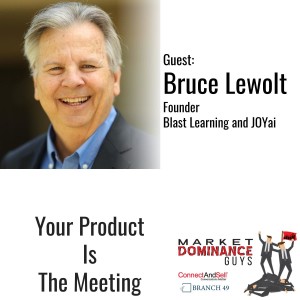
Tuesday Jul 05, 2022
EP139: Your Product Is the Meeting
Tuesday Jul 05, 2022
Tuesday Jul 05, 2022
How many cold-call opportunities have you wasted by pushing hard and fast to sell your company’s product? Today’s podcast guest, Bruce Lewolt, Founder of both JoyAI and Blast Learning, talks about a more caring and effective approach to selling. It starts with switching the goal of that initial call from selling your company’s product to offering prospects a helping hand with a problem or goal they have. Imagine for a moment you’re the prospect, and you’ve just been ambushed by a cold call: Who would you be willing to set an appointment with for a discovery meeting? A person blatantly trying to make a sale? Or a caring professional who understands your business’ needs and wants? In this episode, our three well-reasoned and insightful sales professionals share many insights with our listeners about making a successful cold call, but the one you don’t want to miss is this “aha!” moment. Your job is not selling your company’s product: Your job is selling a discovery meeting. That should make the title of this week’s Market Dominance Guys’ podcast very clear: You’re still selling something, but “Your Product Is the Meeting.”
Listen to Bruce Lewolt's previous episodes in this series:
EP137: What Do Your Prospects Really Hear?
Ep138: Don’t Get Lost in Your Rock ’n’ Roll
More episodes on the topic of Believing in the Meeting are here.
About Our Guest
Bruce Lewolt is Founder of Blast Learning, a service that uses Alexa or Google Assistant as an intelligent personal study assistant, resulting in a state-of-the-art study method that is not just effective but makes learning enjoyable. (See BlastLearning.com and BlastStudy.com) He is also the Founder of JOYai, the first emotionally intelligent and sales-savvy artificial intelligence system for salespeople, bringing intelligent automation to prospecting and selling.
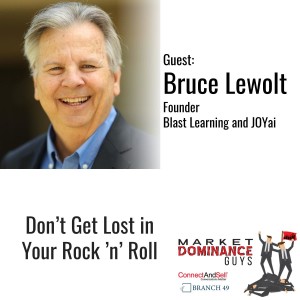
Tuesday Jun 28, 2022
EP138: Don’t Get Lost in Your Rock ’n’ Roll
Tuesday Jun 28, 2022
Tuesday Jun 28, 2022
Training and coaching are essential for the rookie cold caller, and that’s an important part of the life work of today’s guest, Bruce Lewolt, Founder of both JoyAI and Blast Learning. But, as our hosts, Chris Beall and Corey Frank, remind our podcast listeners, even the most experienced and successful cold callers also need coaching from time to time. They can suffer from an inadvertent tendency to drift away from the prescribed plan — the script, tonality, and emotion that they’ve been trained to use — one that generally elicits a prospect’s response of “Sure! Tell me why you’re calling.” Bruce agrees and says that sales directors need to listen to calls and give feedback and coaching to all salespeople on a consistent basis, because it’s human nature to drift away from what you’re taught to say and start doing what feels easier or more comfortable, or putting your own cool, personal stamp on it because that’s the way you roll. It’s not your call to make, so note the caution in today’s Market Dominance Guys’ title and “Don’t Get Lost in Your Rock ‘n’ Roll” and drift away.
About Our Guest
Bruce Lewolt is Founder of Blast Learning, a service that uses Alexa or Google Assistant as an intelligent personal study assistant, resulting in a state-of-the-art study method that is not just effective but makes learning enjoyable. (See BlastLearning.com and BlastStudy.com) He is also the Founder of JOYai, the first emotionally intelligent and sales-savvy artificial intelligence system for salespeople, bringing intelligent automation to prospecting and selling.
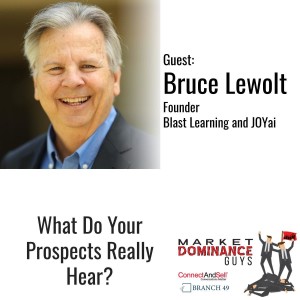
Tuesday Jun 21, 2022
EP137: What Do Your Prospects Really Hear?
Tuesday Jun 21, 2022
Tuesday Jun 21, 2022
How do you produce the emotional reaction that you want in those you are cold calling? Bruce Lewolt, Founder of both JoyAI and Blast Learning, has devoted himself to discovering the answer to this question. Bruce joins our Market Dominance Guys, Corey Frank and Chris Beall, to explain how even the most carefully worded message and well-meaning tone and pacing don’t always have the emotional significance to your prospect that you had hoped they would. “When your prospect is only half-listening, what do they hear?” Bruce asks. Ah, that’s the question! These three experienced and dynamic cold callers each share their well-thought-out theories on how to communicate authenticity, spark curiosity, and offer intrinsic value that will elicit the kind of response from your prospect that will lead to setting a meeting. Here at Market Dominance Guys, we are devoted to helping you answer the tough sales questions, like this one: “What Do Your Prospects Really Hear?”
About Our Guest
Bruce Lewolt is Founder of Blast Learning, a service that uses Alexa or Google Assistant as an intelligent personal study assistant, resulting in a state-of-the-art study method that is not just effective but makes learning enjoyable. (See BlastLearning.com and BlastStudy.com) He is also the Founder of JOYai, the first emotionally intelligent and sales-savvy artificial intelligence system for salespeople, bringing intelligent automation to prospecting and selling.
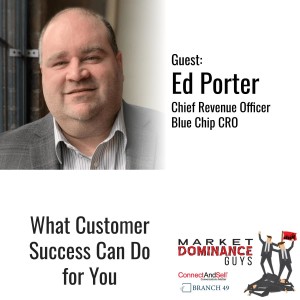
Tuesday Jun 14, 2022
EP136: What Customer Success Can Do for You
Tuesday Jun 14, 2022
Tuesday Jun 14, 2022
What’s the reason customers bought from you and will buy from you again? Don’t know? Look to the end of your buyer’s journey — to the team that helps customers successfully use their purchase. That’s the advice of Ed Porter, fractional Chief Revenue Officer of Blue Chip CRO and today’s Market Dominance Guys’ guest. In this third of three conversations with our podcast’s hosts, Corey Frank and Chris Beall, Ed suggests that you find out what’s working for customers, then take that information back to marketing to finetune the value description of your product so that it matches what customers are reporting. That’s the way to successfully sell your product: Start with the end in mind and work backward to inform marketing strategies and sales messaging. If you didn’t think that customer success had anything to do with selling, it’s time to reconsider, as today’s Market Dominance Guys’ episode’s title says, “What Customer Success Can Do for You.”
Listen to the previous two episodes with Ed Porter.
About Our Guest
Ed Porter is a fractional Chief Revenue Officer for Blue Chip CRO, providing coaching and strategy planning services for executives and startups, and helping them rethink and refocus revenue strategies to accelerate growth. He assists his clients in aligning their revenue teams — marketing, sales, enablement, and customer success — to build accountability at every step of their organization, leading to accelerated and sustainable growth. Ed is also an investor and advisor to startups in the Columbus area.
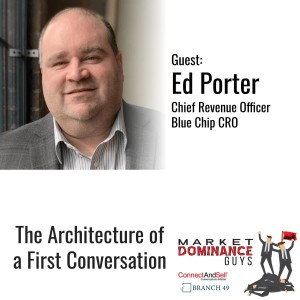
Tuesday Jun 07, 2022
EP135: The Architecture of a First Conversation
Tuesday Jun 07, 2022
Tuesday Jun 07, 2022
Whether you’re new to sales or a seasoned cold caller, you no doubt have a go-to way of starting a phone conversation with a prospect. Excellent! But how’s that working for you? Ed Porter, the fractional Chief Revenue Officer of Blue Chip CRO is our Market Dominance Guys' guest. He talks today about scripts, pattern-interrupts, and the art of conversation with our hosts, Chris Beall and Corey Frank. As Chris points out, that first conversation is an ambush call, and nobody likes to be ambushed, especially by an invisible stranger. Ed totally agrees and adds that “Fear prevents us from picking up the phone” — which is true whether you’re the salesperson or the prospect. So, what can generally get both the caller and the prospect past that fear? A well-constructed cold-calling script, but not necessarily one that a salesperson makes up on their own. Ed says it’s got to be architected from a sound plan that includes expertise and advice from both the marketing and customer success teams, which is why we’ve titled today’s Market Dominance Guys’ episode, “The Architecture of a First Conversation.”
Listen to his previous episode: EP134 - Is sales the real problem?
About Our Guest
Ed Porter is a fractional Chief Revenue Officer for Blue Chip CRO, providing coaching and strategy planning services for executives and startups, and helping them rethink and refocus revenue strategies to accelerate growth. He assists his clients in aligning their revenue teams — marketing, sales, enablement, and customer success — to build accountability at every step of their organization, leading to accelerated and sustainable growth. Ed is also an investor and advisor to startups in the Columbus area.
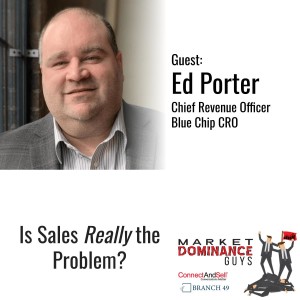
Tuesday May 31, 2022
EP134: Is Sales the Real Problem?
Tuesday May 31, 2022
Tuesday May 31, 2022
If a company isn’t experiencing success, the finger of blame is usually pointed at the sales department. Ed Porter, the fractional Chief Revenue Officer of Blue Chip CRO, is here to say that it ain’t necessarily so. Ed joins our Market Dominance Guys, Chris Beall and Corey Frank, on today’s podcast to talk about his experience in helping companies ferret out the real culprits — and it’s not always the sales reps. In exploring the problem with his own customers, Ed has discovered that marketing and customer success are often the departments that need some repair or fine-tuning. He wholeheartedly agrees with one of Chris’ maxims: In a cold call, “technology amplifies ‘suck’,” which is what you’ll see if there’s a technology-provided increase in your cold-calling speed but there’s no company alignment of messaging, training, coaching, and follow-up. So, take Ed’s advice for business trouble-shooting and ask yourself the question posed by today’s Market Dominance Guys’ title, “Is Sales the Real Problem?”
About Our Guest
Ed Porter is a fractional Chief Revenue Officer for Blue Chip CRO, providing coaching and strategy planning services for executives and startups, and helping them rethink and refocus revenue strategies to accelerate growth. He assists his clients in aligning their revenue teams — marketing, sales, enablement, and customer success — to build accountability at every step of their organization, leading to accelerated and sustainable growth. Ed is also an investor and advisor to startups in the Columbus area.
Connect with Ed Porter on LinkedIn
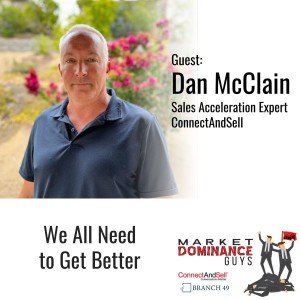
Tuesday May 24, 2022
EP133: We All Need to Get Better
Tuesday May 24, 2022
Tuesday May 24, 2022
How often do salespeople need to be trained? Most people would say, “Once during onboarding should do it.” “Not so,” says Dan McClain, Sales Director at ConnectAndSell. As today’s guest on Market Dominance Guys, Dan talks with our host, Chris Beall, about the importance of periodically sharpening sales reps’ skills. In this second of their two-part conversation, these two sales guys, both amateur chefs, agree that knives work better when they’ve recently been sharpened — and sales reps work better when their selling skills have recently been sharpened. Dan reminds our podcast audience that, over time, all sales reps drift from their company’s established message, their pace may become rushed, or their tone lackluster. For these very reasons, ConnectAndSell’s own reps go through a periodic blitz-and-coach cold-calling session, an essential tool of ConnectAndSell’s Flight School, because, as Dan says, “We all need to get better.” And because this essential advice bears repeating, that’s what we’ve named today’s Market Dominance Guys’ episode: “We All Need to Get Better.”
About Our GuestDan McClain is Sales Director at ConnectAndSell. His life-long dedication to sales has led him to his current goal: helping sales leaders, teams, and individuals connect with their targets at a velocity of 10X by using ConnectAndSell Lightning. Dan is based in the San Diego area and is active in his local chapter of AA-ISP.
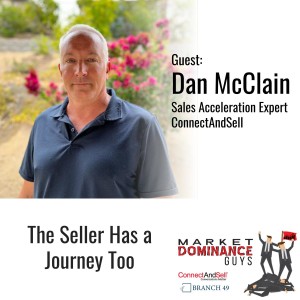
Tuesday May 17, 2022
EP132: The Seller Has a Journey Too
Tuesday May 17, 2022
Tuesday May 17, 2022
You’re no doubt familiar with the buyer’s journey, but what do you know about the seller’s journey? Dan McClain, Sales Director at ConnectAndSell and today’s guest on Market Dominance Guys, shares his personal journey as a salesperson with our host Chris Beall in this first of a two-part conversation. Starting at the beginning of his career, Dan tells the story of how he got into sales straight out of college, what his early selling experiences were like, and how he cold-called his way to where he is today. Most memorable for him was his first experience using ConnectAndSell Lightning, the cold-calling tool that boosts the number of conversations a salesperson can have with prospects. Pushing that “Go” button and being served one conversation after another changed his life and led to his current job selling Lightning at ConnectAndSell. Helping other salespeople discover this tool is now Dan’s mission. Listen in as Dan and Chris remember the details of their first meeting in today’s Market Dominance Guys’ episode, “The Seller Has a Journey Too.”
About Our Guest
Dan McClain is Sales Director at ConnectAndSell. His life-long dedication to sales has led him to his current goal: helping sales leaders, teams, and individuals connect with their targets at a velocity of 10X by using ConnectAndSell Lightning. Dan is based in the San Diego area and is active in his local chapter of AA-ISP.

Tuesday May 10, 2022
EP131: Why Conversations Matter
Tuesday May 10, 2022
Tuesday May 10, 2022
“When you share your life nuggets, you don’t know when it’s going to matter to someone,” observes Elena Hesse, our Market Dominance Guys’ guest and the Vice President of Operations of Thomson Reuters’ tax and accounting professionals in this third of three podcast episodes with our hosts, Chris Beall and Corey Frank. For the past four years, Elena has led the “NoTimeToRead Book Club” for #GirlsClub, an organization dedicated to changing the face of sales leadership by empowering more women to earn roles in management. Corey starts off the conversation by asking Elena to describe what happens in a book club that doesn’t require reading the book. “A book is just a vehicle for a conversation. You never know when something is going to resonate,” she says, as she explains how the subject matter generates ideas and experiences that club members share with each other. And just like the book club participants, Corey, Chris, and Elena share ideas and personal insights of their own, which cover everything from the sales benefits of a live conversation over an emailed message to the trust-creating habit of asking for clarification when you don’t understand something. As Chris says, “The essence of curiosity is embracing our ignorance.” So, get ready to open your mind and heart to embrace what these three experienced salespeople share with each other — and with you — about the essence of this week’s Market Dominance Guys podcast, “Why Conversations Matter.”
About Our Guest
Elena T. Hesse, Vice President, Operations – Tax & Accounting Professionals at Thomson Reuters, has been with this firm for more than 30 years. Elena is also a thought leader for #GirlsClub, leading the book club discussions to support #GirlsClub and its continuing work of changing the face of sales leadership by empowering more women to earn roles in management.

Tuesday May 03, 2022
EP:130 Do You Have Skin in the Game?
Tuesday May 03, 2022
Tuesday May 03, 2022
“When you go to a doctor, do you want that doctor to be excellent — or okay?” Elena Hesse, our Market Dominance Guys’ guest and the Vice President of Operations of Thomson Reuters’ tax and accounting professionals, poses this question to our podcast hosts, Corey Frank and Chris Beall. Their answer — and yours too, no doubt — is that they want doctors who love their job and do it extremely well. Elena, Chris, and Corey talk about how this equates to the role of the salesperson. In the old days, sales was generally a “hit and run” affair. You’d probably never see your customers again once the sale was made, so there was little reason to provide true value in a product or to develop and maintain a relationship with a customer. But in the modern world, most of us want to sell our customers an upgrade or an add-on or a renewal. So, product value and excellent customer relations are essential. In other words, if you want to be successful in sales today, our three sales experts say that it’s crucial to have skin in the game. Oh, yeh. It’s self-examination time. Evaluate your personal investment in your job as you listen to today’s Market Dominance Guys’ episode. “Do You Have Skin in the Game?”
About Our Guest
Elena T. Hesse, Vice President, Operations – Tax & Accounting Professionals at Thomson Reuters, has been with this firm for more than 13 years. Elena is also a thought leader for #GirlsClub, leading the book club discussions to support #GirlsClub and its continuing work of changing the face of sales leadership by empowering more women to earn roles in management.
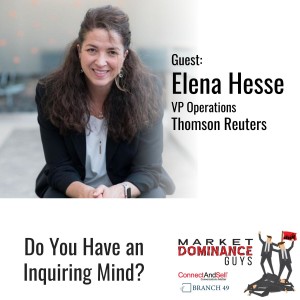
Wednesday Apr 27, 2022
EP129: Do You Have an Inquiring Mind?
Wednesday Apr 27, 2022
Wednesday Apr 27, 2022
“If you’re not curious, you’re not going to be a good sales rep.” That’s the well-considered opinion of our Market Dominance Guys’ guest, Elena Hesse, Vice President of Operations of Thomson Reuters’ tax and accounting professionals. As a naturally curious person herself, Elena has observed that “You can’t be speaking more than you’re listening” if you’re going to learn what you need to know about your prospects and their businesses. You have to ask those insight-seeking questions and then truly pay attention to their answers in order to discover whether your product or service is a good fit for their needs. Our two podcast hosts, Corey Frank and Chris Beall, totally agree with Elena that the best way to establish a good relationship with your sales prospect is with an inquiring mind — not a sales pitch. Curious about what else these three have to say? Listen to today’s Market Dominance Guys’ episode, “Do You Have an Inquiring Mind?”
About Our Guest
Elena T. Hesse, Vice President, Operations – Tax & Accounting Professionals at Thomson Reuters, has been with this firm for more than 13 years. Elena is also a thought leader for #GirlsClub, leading the book club discussions to support #GirlsClub and its continued work in changing the face of sales leadership by empowering more women to earn roles in management.
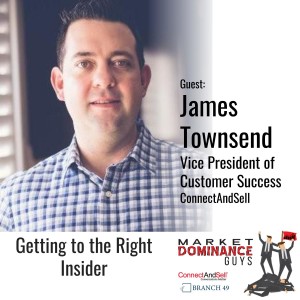
Wednesday Apr 20, 2022
EP128: Getting to the Right Insider
Wednesday Apr 20, 2022
Wednesday Apr 20, 2022
The triumphs, rewards, and prosperity of the customers he serves is at the heart of everything today’s Market Dominance Guys’ guest does. Meet James Townsend, Vice President of Customer Success and Growth at ConnectAndSell, as he discusses with our host, ConnectAndSell CEO Chris Beall, the different ways that sales has changed in the 10 years since James joined the company. They compare acquiring data on prospects, targeting the right insertion points (aka company insiders), the importance of cold call training, and selling vs. serving customers’ needs. You’ll want to stay tuned to the very end when they talk about what they see as “the next frontier,” on today’s Market Dominance Guys’ episode, “Getting to the Right Insider.”
About Our Guest
James Townsend is Vice President of Customer Success and Growth at ConnectAndSell, a company that pioneered the service of getting prospects on the phone for its customers’ cold callers to talk to. As one of his LinkedIn followers states, “James is a consummate professional with a deep desire to see his clients succeed.”
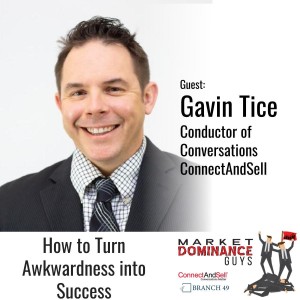
Monday Apr 11, 2022
EP127: How to Turn Awkwardness into Success
Monday Apr 11, 2022
Monday Apr 11, 2022
Does the thought of placing a cold call make you tense, nervous, embarrassed, or tongue-tied?
Today’s Market Dominance Guys’ guest, Gavin Tice, a sales instructor for ConnectAndSell’s Flight School, says not to worry about this awkwardness. He even says it’s an okay place to start. What a relief, huh? Our hosts, Corey Frank and Chris Beall, talk with Gavin today about how a standard operating procedure — in this case, a tried-and-true cold call script and method of delivery — can turn that frown upside down. What Gavin teaches is how to have a lot of fun and success making cold calls. Yes, you heard right: FUN! What a great reason to listen in while this Conductor of Conversations and our podcast hosts discuss the ways that SOPs, social work, psychology, and introversion positively impact the cold-calling experience in today’s Market Dominance Guy’s topic, “How to Turn Awkwardness into Success.”
About Our Guest
Gavin Tice is a Flight School instructor for ConnectAndSell. His background in the military and as a social worker have bestowed on him the perfect mix of skills needed to be a member of ConnectAndSell’s conversation optimization team, as he helps his Flight School students make success-building changes to their cold-calling delivery. A former team member of Gavin’s gives him this accolade: “Gavin’s depth of experience with sales and relationship building is like nothing I've encountered before. He brings his all to the table, every time.”
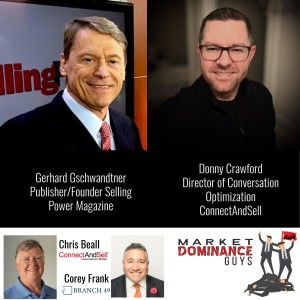
Tuesday Apr 05, 2022
EP126: Pattern Interrupts Are Your Friend
Tuesday Apr 05, 2022
Tuesday Apr 05, 2022
What’s a pattern interrupt? And how can it help you break down the resistance most people feel when ambushed by a cold call? Donny Crawford, Director of Conversation Optimization at ConnectAndSell, joins our Market Dominance Guy, ConnectAndSell CEO Chris Beall, on a Selling Power webinar hosted by Founder Gerhard Gschwandtner. These three conversation experts share some little-known tricks of the cold-calling trade, one of which is that saying something unexpected, like “Can I have 27 seconds to tell you why I called?”, can break a prospect’s usual pattern of hanging up or refusing to engage. As Donny says, it truly is a game-changer, especially when said in a friendly, playful voice. “The friendliness actually matters,” he explains. “You’ve got to be assertive enough, but in a friendly manner.” Get ready to absorb this and other helpful tips from ConnectAndSell’s Flight School cold-calling training lessons in this Market Dominance Guys’ episode, “Pattern Interrupts Are Your Friend.”
About Our Guest
Donny Crawford is Director of Conversation Optimization at ConnectAndSell. With the expertise developed as a former customer and as Customer Success Manager at ConnectAndSell, he operates as chief instructor of Flight School, a structured program designed to help cold callers find their voice. Hear more from Donny Crawford on his other Market Dominance Guys’ episodes.
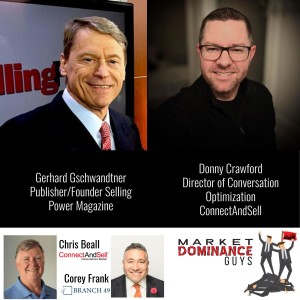
Wednesday Mar 23, 2022
EP125: Find Your Cold-Calling Voice
Wednesday Mar 23, 2022
Wednesday Mar 23, 2022
When you’re making a cold call, is the voice you’re using an effective voice? Or could it use a little fine-tuning so that you can engender trust with your prospect — the trust needed to secure a discovery meeting? Donny Crawford, Director of Conversation Optimization at ConnectAndSell, joins our Market Dominance Guy, ConnectAndSell CEO Chris Beall, to walk you through how to find your most effective cold-calling voice. In previous episodes of this podcast, you may have heard our guys talk about ConnectAndSell’s Flight School cold-call training program. In today’s episode, you’ll get a mini–Flight School lesson all your own, presented by master instructors, Donny and Chris. Not only will you get a tried-and-true script, but more importantly, you’ll hear detailed instructions on how to use your tone of voice to achieve cold-calling success. As Donny says, you’ll learn to bring out your “friendly voice,” and when you do, you’ll see how that voice can make some magic happen. All this — and so much more — in today’s Market Dominance Guys’ episode, “Finding Your Cold-Calling Voice.”
About Our Guest
Donny Crawford is Director of Conversation Optimization at ConnectAndSell. With the expertise developed as a former customer and as Customer Success Manager at ConnectAndSell, he operates as chief instructor of Flight School, a structured program designed to help cold callers find their voice. Learn more from Donny Crawford on these Market Dominance Guys’ episodes:
“Three Reasons Sales Reps Don’t Follow Up” https://marketdominanceguys.com/e/three-reasons-sales-reps-dont-follow-up/
“The Power of the Anti-Curse to Overcome Rejection” https://marketdominanceguys.com/e/the-power-of-the-anti-curse-to-overcome-rejection/
“Your Sales People Are Brain Surgeons” https://marketdominanceguys.com/e/your-sales-people-are-brain-surgeons/
“Never, Never, NEVER Retire a Follow-Up Call” https://marketdominanceguys.com/e/never-never-never-retire-a-follow-up-call/
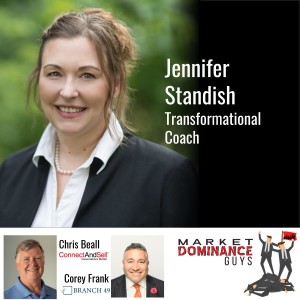
Tuesday Mar 15, 2022
EP124: The Magical Type of Cold Call
Tuesday Mar 15, 2022
Tuesday Mar 15, 2022
Are you motivated to help the prospects you’re cold-calling? Jennifer Standish, Founder of Prospecting Works, joins our Market Dominance Guys, Corey Frank and Chris Beall, in this third of a three-part conversation to talk about different approaches to this process we call “sales.” Thinking of a sale as a “win,” implies that sales is a contest between you and your prospect — and your prospect is the loser. Does this sound like cause for a happy dance? Jennifer says it makes her crazy to hear salespeople say that they’re “killing” their numbers. Corey and Chris agree that this aggressive attitude could also kill the chance of developing a trusting relationship with a buyer, a relationship that would serve both parties now and in the future. Oh, these three savvy sales folks know what’s what when it comes to making magic happen between a salesperson and a prospect. You’re going to want to take notes while you’re listening to this week’s Market Dominance Guys’ episode, “The Magical Type of Cold Call.”
Catch the previous two episodes in this conversation here:
EP122: Learning to Manage Your Voice Under Pressure
EP123: Hire Yourself a Grandma
About Our GuestJennifer Standish is Founder of Prospecting Works, an organization that assists salespeople in overcoming cold-call reluctance. She combines her 25-year cold-calling career with her skills as an intuitive healer, offering a “warm and fuzzy” approach that attracts introverts as well as people who don’t want to be considered salespeople.
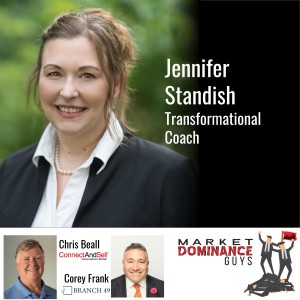
Tuesday Mar 08, 2022
EP123: Hire Yourself a Grandma
Tuesday Mar 08, 2022
Tuesday Mar 08, 2022
Would you hang up on your grandmother? Of course not! Jennifer Standish, Founder of Prospecting Works, joins our Market Dominance Guys, Corey Frank and Chris Beall, in this second of a three-part conversation to talk about the perfect voice for cold-calling success. Certain voices cause people to react in a positive way, and it turns out that a female over the age of 60 has the perfect voice to get that positive reaction needed to be a successful cold-caller. Who knew?! Well, researchers like Jennifer did. She has discovered that with a little training, middle-aged women without an identifiable accent are phenomenal appointment-setters. Corey and Chris enthusiastically agree with her that “grandmas are the untapped labor market we need in sales.” If this sounds bizarre to you, tune in to hear how the nuances of voice affect the trust you need to establish in the first critical moments of a cold call. It’s all on today’s Market Dominance Guys’ episode, “Hire Yourself a Grandma.”
Listen to the first part of this conversation:
EP122: Learning to Manage Your Voice Under Pressure
and the next segment after this one:
EP124: The Magical Type of Cold Call
About Our GuestJennifer Standish is Founder of Prospecting Works, an organization that assists salespeople in overcoming cold-call reluctance. She combines her 25-year cold-calling career with her skills as an intuitive healer, offering a “warm and fuzzy” approach that attracts introverts as well as people who don’t want to be considered salespeople.
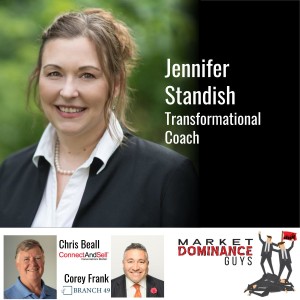
Wednesday Mar 02, 2022
EP122: Learning to Manage Your Voice Under Pressure
Wednesday Mar 02, 2022
Wednesday Mar 02, 2022
Jennifer Standish, Founder of Prospecting Works, is preaching to the Cold Calling Choir when she says that cold calling trainers don't spend enough time working with their people on their delivery. Jennifer and our Market Dominance Guys, Chris Beall and Corey Frank, all believe that a great script that hits all the points but has a terrible delivery won't get you any appointments. However, a great delivery — even if you're working with a mediocre script — will absolutely bring in the appointments. In this podcast, they also emphasize the importance of a salesperson's mindset when it comes to being a successful cold caller. If you think everybody's going to hang up on you, that everybody's going to be nasty to you, well, then, that is generally what you're going to get. But if you believe in your core that your product or service can truly help people, if you are certain of the integrity of your offering, then you can sell people on your belief. Why? Because your authenticity will come through to your prospects, loud and clear. Listen to this first of a three-part Market Dominance Guys' series by these three cold-calling gurus on today's episode, "Learning to Manage Your Voice Under Pressure."
Then, listen to the next two parts of this conversation here:
EP123: Hire Yourself a Grandma
EP124: The Magical Type of Cold Call
About Our GuestJennifer Standish is Founder of Prospecting Works, an organization that assists salespeople in overcoming cold-call reluctance. She combines her 25-year cold-calling career with her skills as an intuitive healer, offering a “warm and fuzzy” approach that attracts introverts as well as people who don’t want to be considered salespeople.
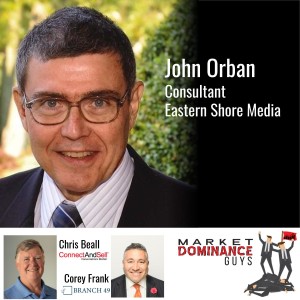
Tuesday Feb 22, 2022
EP121: Beware the Jabberwock, my son!
Tuesday Feb 22, 2022
Tuesday Feb 22, 2022
How do you de-risk your company? Marketing and business consultant John Orban and our Market Dominance Guys, Chris Beall and Corey Frank, wind up their four-part conversation by offering our listeners a great deal of advice about how to balance potential risk. These three sales scholars delve into the potential problems of forecasting your company’s success, the possible perils of determining the market value of your sales pipeline, and the pitfalls of the practice of inflating your sales and revenue prior to a reporting period, which is known as “stuffing the channel.” “I give myself good advice, but I seldom follow it,” admits Lewis Carroll’s famous character, Alice. In this vein, Chris warns that being in love with your brilliant idea for a business can make you into your great idea’s zombie — ignoring all you’ve learned about de-risking. Save yourself from that fate by listening to this week’s Market Dominance Guys’ episode, “Beware the Jabberwock, my son!”
The complete poem by Lewis Carroll is here.
About Our Guest
John Orban brings his background as a MetLife sales rep and as an administrator of computer networks to his current career as a marketing and business consultant for creative professionals.
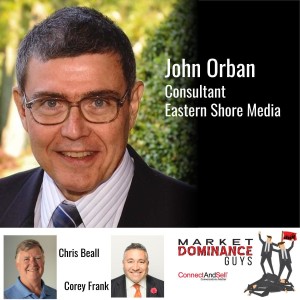
Tuesday Feb 08, 2022
EP120: Six impossible things before breakfast
Tuesday Feb 08, 2022
Tuesday Feb 08, 2022
Do you believe that the cold calls you make are an interruption in your prospect’s day? Well, they definitely are! But to what purpose? Marketing and business consultant John Orban and our Market Dominance Guys, Chris Beall and Corey Frank, use part three of a four-part conversation to take this inherent problem in sales and look at it from a different angle. Chris cites the podcast he did with ConnectAndSell’s Matt Forbes, whose epiphany about how belief in the opportunity he offers his prospects changed everything about the way he conducts cold calls. John cites the epiphany he experienced reading Betty Edwards’ book, Drawing on the Right Side of the Brain, when he discovered how a book can change your awareness of ordinary things and lead you to look at your world differently. Chris touts Geoffrey Moore’s book, Crossing the Chasm, for opening his eyes and engendering a new belief in empathy and how employing that essential quality can help you build trust with a prospect. And, with another of his insightful summations, Corey ties all these ideas together with the advice to “major in minor things.” Be prepared to garner insights of your own as our three dedicated students of sales and of life share with you their practice — just like Alice’s — of believing “Six impossible things before breakfast” on this episode of the Market Dominance Guys.
Drawing on the Right Side of the Brain - Betty Edwards
Crossing the Chasm - Geoffrey A. Moore
About Our Guest
John Orban brings his background as a MetLife sales rep and as an administrator of computer networks to his current career as a marketing and business consultant for creative professionals.

Wednesday Feb 02, 2022
EP119: Curiouser and Curiouser
Wednesday Feb 02, 2022
Wednesday Feb 02, 2022
Would you expect introverts to be good at cold calling? Oddly enough, they aren’t just good —they’re great! Today, we delve into why introverts make great salespeople in this second part of a four-part conversation between marketing and business consultant John Orban and our Market Dominance Guys, Chris Beall and Corey Frank. It turns out that introverts’ reluctance to push themselves forward makes them less likely to take over a cold-call conversation, and this allows prospects to talk. And when prospects talk — shazam! — we learn things about them that help us become partners on their sales journey. This insight sparked John to ask Chris the question, “What role do you think curiosity plays in the process of making a cold call?” Listen in to learn the whys and wherefores of this valuable cold-calling asset on this Market Dominance Guys’ episode, “ ‘Curiouser and Curiouser.’ ”
About Our Guest
John Orban brings his background as a MetLife sales rep and as an administrator of computer networks to his current career as a marketing and business consultant for creative professionals.
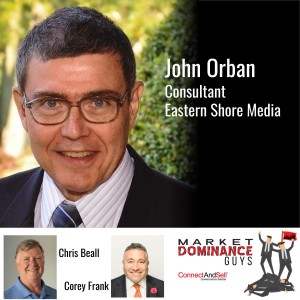
Tuesday Feb 01, 2022
EP118: Of Cabbages and Kings — and Blue Whales
Tuesday Feb 01, 2022
Tuesday Feb 01, 2022
“The time has come,” the Walrus said, “to talk of many things.” Our podcast guest, John Orban, is currently a marketing and business consultant who spent 24 years honing his sales skills as a rep for MetLife. Today, John joins our Market Dominance Guys, Chris Beall and Corey Frank, to talk of many sales- and life-related things. In this first episode of a four-part conversation, John, Chris, and Corey touch on the trickiness of successfully communicating an idea, on the importance of thinking but not over-thinking, on resisting the temptation to make things complex, and finally, on the math employed in sales and, thus, market domination. There’s even a bit about the stability of cruise ships. Seriously. Many things! And these three sales guys are just getting started, so don’t miss the fun in this Market Dominance Guys’ episode, “Of Cabbages and Kings — and Blue Whales.”
About Our Guest
John Orban brings his background as a MetLife sales rep and as an administrator of computer networks to his current career as a marketing and business consultant for creative professionals.
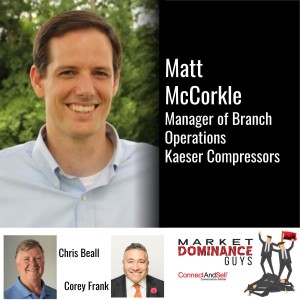
Tuesday Jan 18, 2022
EP117: We Try Hardest!
Tuesday Jan 18, 2022
Tuesday Jan 18, 2022
In striving for market dominance, which among the top companies in any field do you think puts forth the most effort to gain — or hold onto — that dominant position? Our guest, Matt McCorkle, Manager of Branch Operations for Kaeser Compressors, and our two Market Dominance Guys, Chris Beall and Corey Frank, debate this question during this final conversation of their four-part discussion on all things sales-related. Even loyal followers of our Market Dominance Guys’ podcast will be surprised at the shared opinion these three sales gurus hold about which highly ranked company within each industry or service can claim bragging rights to the title of this episode, “We Try Hardest!”
About Our Guest
Matt McCorkle is Manager of Branch Operations for Kaeser Compressors. He has earned both a bachelor’s degree and a master’s degree in mechanical engineering and has now been with Kaeser Compressors for 13 years.
Catch the three previous episodes in this session with Matt McCorkle:
EP107: On the Phone, They’ll Tell You the Truth
EP108: Sales and the State of Apprehension
EP109: Being There for Your Customers
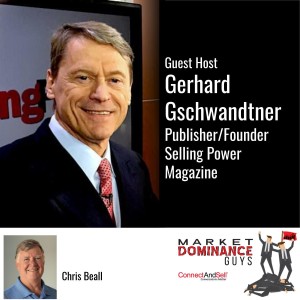
Tuesday Jan 11, 2022
EP116: Who’s Ready to Buy Right Now?
Tuesday Jan 11, 2022
Tuesday Jan 11, 2022
When your prospect’s response to your cold call is “Not now,” do you assume they mean they’re too busy to talk at that moment? Or perhaps this is just their way of getting rid of you altogether. Our Market Dominance Guy, Chris Beall, talks with Gerhard Gschwandtner, CEO and founder of Selling Power, in this podcast about a more probable reason you’re hearing “Not now.” It has to do with the replacement cycle and consideration cycle of businesses. In other words, where they are in the three-year buying cycle most businesses utilize for timing when they begin considering a new product or service — or replacing an existing one. Once you determine if “Not now” really means “We’re not ready to purchase at this time,” what you do next is critical! Listen in as Chris and Gerhard divulge the intelligent way to deal with the 11/12ths of the market who aren’t ready to buy at this time. Take my word for it: You won’t want to miss the market-dominating advice you’ll hear on this Market Dominance Guys’ episode, “Who’s Ready to Buy Right Now?”
About Our Guest HostGerhard Gschwandtner is founder and CEO of Selling Power magazine, as well as CEO of the Sales 3.0 Conference series. Gerhard’s career has always been centered around helping sales leaders create peak performance in business and in life through video interviews, online events, and live workshops and retreats.

Tuesday Jan 04, 2022
EP115: The Enemy of Your Message Is Drift
Tuesday Jan 04, 2022
Tuesday Jan 04, 2022
The only reliable way to see if your company’s value statement resonates with your prospects is to have lots of conversations with them, and for that, of course, you need salespeople. But as our Market Dominance Guy, Chris Beall, tells our guest host, Gerhard Gschwandtner, founder and CEO of Selling Power magazine, that’s not all you need. You first require an expert to craft the scripted message salespeople will use in their cold calls. And you need a coach to train your callers to deliver that message in the most effective way. Once cold-calling begins, you then need a coach to make sure your salespeople don’t drift from your carefully crafted script and specified way of delivering it. “Under pressure,” Chris says, “we all begin to drift, to try something a little different, something unproven. So, somebody’s got to keep the salespeople together, and that’s the coach.” Join Gerhard and Chris as they provide coaching on the importance of sales-call coaching in this week’s Market Dominance Guys’ episode, “The Enemy of Your Message Is Drift.”
About Our Guest Host
Gerhard Gschwandtner is founder and CEO of Selling Power magazine, as well as CEO of the Sales 3.0 Conference series. Gerhard’s career has always been centered around helping sales leaders create peak performance in business and in life through video interviews, online events, and live workshops and retreats.
Full episode transcript below:
Chris Beall (01:20):
You're going to start with one. Right. This is really simple. So you make a list of some possibilities and then you start putting companies in those lists and then you choose the one that's kind of right-sized. Hey, we think we're going to sell for average sales price of $37,000. That's our guess. And we're going to have a gross margin of 73%. That's our guests because we've looked at our cost of goods and all that. And so if we get about this many looking at our overhead, we will be profitable. That's cool. Or maybe we'll be financable, which is a speculation about future profits.
Chris Beall (01:57):
So we need a market about this big. So let's not make one any smaller than that. And then we're going to make some lists. This is why having the reps make the list doesn't make sense. This process would not work with a bunch of sales reps. This is executive management with the marketing function and the product function, getting together and you make the list. And you go, here's one, here's one, here's one. You could close your eyes and pick one at random, but don't pick two or three and don't address two or three at a time. We address two now, ourselves at ConnectAndSell. We've been in business 15 years.
Gerhard Gschwandtner (02:29):
Wow.
Chris Beall (02:29):
We've been selling successfully in the marketplace for 15 years. We're up to two. I'm thinking of adding a third. I'm almost there, but guess what? My salespeople are not adding the third. We're going to add the third over here in executive mysteries. This is board of directors level stuff. And like, are we going to do this? Because it represents risk and it represents an investment. So how do you choose the ones you're not going to pay attention to? It's all the ones that aren't the one you are paying attention to. One is an easy number. It's a lonely number. It's according to a song,
Gerhard Gschwandtner (03:04):
Right.
Chris Beall (03:04):
Lonely. But you have to be as old as us to even have heard that song Gerhard. So that's what an addressable market is. So I've already addressed this, but I'm going to address it again. Business leaders and sales leaders need to be business leaders. You must dominate at least one market because somebody will. That is whatever you're doing fits in one market, two markets, three markets, whatever, somebody is going to be the dominant player. That's called just math. Right. If you run a race, somebody's going to win the race. I don't need to know who it is to know that it's somebody. There's a little piece of calculus if you remember Gerhard, that they taught us that, right?
Gerhard Gschwandtner (03:42):
Right.
Chris Beall (03:42):
So it's a little fact about curves and this has to do with this maximum and minimum thing. So if you don't dominate at least one market, you have two problems. One is a survival problem because whoever dominates that market is going to choose whether you survive or not. They're going to keep you around kind of as their servant. Oh yeah. You take those, we'll take these, the good ones. You can have the leftovers. Right. So you're the dog under the table, hoping for scraps. That's not the greatest position to be in, especially if somebody can put the dog out or put the dog down, which is not so great. Right.
Chris Beall (04:19):
So the other reason is that it drives valuation. And whether you're a private company or public company or whatever, valuation is an expression of the willingness of others to invest in your future. That's exactly what it is. So you'll get 10 times the valuation for being a dominant player than for being the number two player. So you only have to dominate one 10th as many markets, like one and you get evaluation. That's according to the dominant player, and according to the other factors of your business. Like what are your gross margins, blah, blah, blah, blah, blah. Now I realize in the venture capital-dominated world, this is a funny thing. They don't like this so much. What they want you to do is to spend their money relatively quickly and show that you might have some currency across a whole bunch of potential markets.
Chris Beall (05:16):
And they rely on roughly speaking, only two or 3% of you surviving and the rest turn into salvage operations. So if you want to play that game, you can go play that game. It's still really smart early in that game before you take the venture capitalist money to know that you can dominate one market. So what you do is you just make the list and you go talk to them and you don't even build the product. You just talk to them and you get the resonance and you know the meetings are moving forward. Then go get the money from the VCs and then you won't be conflicted because now you can sell and make them happy, sell and grow.
Chris Beall (05:51):
And meanwhile, you can also be dominating, which is your, that's your safety factor, because guess who you have to deal with at that point? You have to deal with the VCs. And if you dominate one market, if they don't want to fund you in the future, you just tune your overhead down and you're profitable and enjoy life. And then go find another market to dominate. So instead of being in that two or 3% that succeed, you will be in the 100% that succeed. Dominating at least one market assures success. It's very hard to go out of business as the dominant player in one market. It just is.
Gerhard Gschwandtner (06:26):
It's a very, very powerful lesson . And there's something I think a psychological inhibitor that especially in S&B where business owners don't think that way. They think more in terms of survival or meeting immediate needs. But I think that the domination strategy that you're espousing makes a lot more sense.
Chris Beall (06:55):
Well it does. And by the way, it goes along well with survival and meeting immediate needs in a funny way. But it does mean you have to have the discipline to not do deals with folks that are not in your market. Or to reevaluate a very specific question, which is, did we just miss them? We should have put them in the list and we didn't. But I tell you confirmation bias will make you invite unwanted guests into your market and they will distract you. The disease that kills companies is distraction. That's why little companies shouldn't do quote-unquote strategic partnerships with other little companies. They give each other the disease called distraction and it's highly communicable. So be careful of it. You need focus. And the focus is, starts with the list. It's really easy to stay focused when you have that list.
Gerhard Gschwandtner (07:45):
Yeah.
Chris Beall (07:45):
You can go through the list and say, have we talked to everybody on this list? We haven't. Let's take the ones we haven't talked with and try to talk to them. Okay. If somebody wants help doing that, come to me. I can help you talk to a whole bunch of people. That's what we do, is like to folks. Right. And we help you talk to people. Have we got a meeting with everybody on the list? Not yet. Well, we have a job to get a meeting with the rest. Have we learned from the meetings that we've had? What resonates? So what percentage are resonating on the economics, what on the emotional, and what on the strategic, and what didn't resonate at all? That's a little trickier, but it's very objective step, by step, by step.
Chris Beall (08:26):
And by going step by step, we do take care of immediate needs. Because guess what? We'll actually be closing business sooner than not. And the best part is it keeps getting easier instead of getting harder. That's the reason you do this. Now here's a funny thing about markets and it's really awkward. One is you need different people to go on a market dominance program than are normally hired. And we already saw the answer in the poll. You need either externally or internally, somebody to do dispassionate research and make that list. And they cannot be distracted by oh, their comp plan for instance, right? I mean, it's like, can you imagine CEO of the company goes well, I made the list like this. It turns out it took us right off a cliff, but it helped me make an extra $50,000 last year. Like no, you get fired for that as a CEO. Well, this as a person has to have the CEO hat on, so to speak and they've got to be tied to future market dominance. So you need to hire either internally or externally somebody to do research.
Chris Beall (10:19):
Research. You also need to either hire or put in place processes that cause you to have a structured identical message that asks the question, do you care about the economics? Do you care about the motions or do you care about the strategy piece of what we offer or nothing? And you need to have people who are expert at delivering that. That means you got to hire somebody to help you put together a message that reliably, I call it taps the bells. So think of it like this. You have an assembly line going by you and your job is to determine which of these things that look like bells are actually bells. I was just in Italy and they have beautiful bells there and they're made out of whatever they're made out of metal, right, brass, bronze. I don't know how they make bells.
Chris Beall (11:06):
So they have these beautiful bells. But what if the bells could be made of clay? And they just go thud and they look identical. They weigh the same and they're going by you. And your job is to figure out which ones are bells that we can ship to our customers and which ones are duds that we have to just send back to be crushed up into clay again. Well, you tap them. Boom or thud. Right. That's what we do with conversations.
Chris Beall (11:35):
The only reliable way to determine that somebody is resonating like a bell with our message is one, to have a message. So we need to hire somebody who is really good at putting together a message that works psychologically for people so that they will resonate or not with one of these three elements. It's simple. It doesn't take very long to do. But now we need to hire another person and could be the same person, a coach to make sure that everybody's staying precisely on that message because the big problem with focus is the enemy of focus is drift. So distraction leads us to be scattered, but drift and Gerhard you and I know this well, right? We're both golfers. And we both know what happens to our golf swings.
Gerhard Gschwandtner (12:22):
Right.
Chris Beall (12:23):
When we quote-unquote, find something, right, on the range or whatever, or we have a lesson or whatever it is and we kind of got it, what happens? Under pressure of playing on the actual golf course, whether competitively or not, we begin to drift. We're tempted to try something a little different, right? We're tempted. And it's why golf is this funny game, right? It tempts you inside your mind to try something unproven because that last one didn't work so well, I'll try this. So drift is the enemy of the precision you need to have your message delivered the same every time, which it takes to know if you're resonating.
Chris Beall (13:06):
That is if sometimes I'm tapping the bell and sometimes I'm just waving a stick around, and sometimes I pick up a little hammer into it, and sometimes I do it with my finger, I'm not learning about bells. I'm learning about hammers and fingers. I'm learning about my reps. So somebody's got to keep the reps together and exploring the market systematically with a message. And that's a coach. Coaching needs to be done in real-time. Just like a golf swing. You can't bring me your golf swing from last week. Describe it to me and I'll coach you. I got to watch you while you're doing it and go, Gerhard, remember when it was really, really great because you actually had your right hand a little bit more on top of the club so your wrist could hinge rather than the thing you're doing right now with the thumb behind it that ain't going to work. Right.
Chris Beall (13:53):
In real-time, we could do that. At the end of the week, you're describing it to me. That's how we tend to coach sales reps. We get them together on a one-on-one at the end of the week and then we tell them war stories or we ask them how it's going or whatever. Right. This is performance. This is performance. And we've got to have a coach who coaches to performance in real-time. And then of course, we need to hire people who can have the conversations. By the way, they can be junior people, they can be senior people as long as they sincerely believe in the potential value of the meeting that they're selling, but they got to sell the meeting. The meeting is the first concrete step into the market that tells you whether that resonance is happening.
Chris Beall (14:33):
How do you know the bell rings? They take the meeting. Not they said a nice thing. Oh, I'm interested. Send me some information, blah, blah, blah. No, no, no. They take a meeting. So you've got to be trying to sell the meeting, but what's valuable in the meeting, learn it. So your reps have got to know what's valuable in the meeting, right? So you have to hire the right kind of people. You have to train them up to sell the meeting. You got to coach them in real-time and they need to avoid drift. Otherwise, you don't know what's going on in your market. That's a bunch of very practical things to do. And then your list is made by a research team or by marketing, if they're doing it honestly. And the driver for that is the company strategy.
Gerhard Gschwandtner (15:12):
I think you did a lot of thinking on your vacation about this because we have done a number of webinars together. And this is an experience today where you come up with a lot of clarity and a lot of good insights that are fundamental to running a business that's focused on market dominance. The enemy of focus is drift. We got to share it on Twitter. We got to share it on LinkedIn because so many salespeople drift away from their process, from their script, from their story, and they improvise like you and I do on a golf course.
Chris Beall (15:53):
Exactly, exactly. And they do it because it's uncomfortable doing the other thing. And by the way, you need to build what is conventionally considered sales pipeline in order to know that you're dominating the market. You got to actually be engaging with folks. That first engagement is probably going to be an ambush conversation. And the reason is simple. You can't figure out that resonance with the economics, or the emotions, or the strategy by sending somebody an email. The clever email that gets somebody to take a meeting, for instance probably is not a gate other than this is a person who takes meetings. That's not what you're looking for. You're actually, you have to do it the other way around. Define the role and the company and then talk to them. But the first time you talk to them, they're probably not going to be as ready for you to talk to them. You got to ambush them. It's kind of sad actually, but you got to do it.
Chris Beall (16:52):
And so to build that pipeline, we have to have first conversations. And first conversations with strangers are extremely uncomfortable. In fact, they're right at the edge of choosing to be exiled from the village. If you want to kind of go in the hierarchy of bad things that humans really don't like, here's what they don't like. One, they don't like invisible strangers. They don't like them. Because in the environment of evolution, I'm reading The Decameron right now, by the way, Boccaccio's Decameron. Right. So even just back there in Florence, in the 1300s, just then not that long ago, it was dark at night. There were no electric lights. Probably a quarter of the stories that those 100 stories involve an invisible stranger. Invisible strangers are scary, scary things. They're not here to bring us a Bud Light.
Chris Beall (17:46):
They're the bad people from across the river. We're really civilized in the village that we live in. We paint our faces vertically. Those horrible people, they paint them horizontally. That's terrible. Everybody knows that's bad, except them apparently. And they speak a little differently and they eat food that smells not quite like ours. And when they show up at night, that's why they're invisible. And they're not here to bring us a Bud Light. They're here to change the demographics of our village to look more like their village because we won't be here anymore. So we don't like invisible strangers. And we don't like exile. We don't like being kicked out of the village. So here we are getting those emotions about being an invisible stranger and maybe being rejected by somebody, exiled. And we package it all together and call it a cold call.
Chris Beall (18:38):
And it's awkward and it's tough. It's not as tough as people think. You can learn how to do it. And you have to have the right mindset and you teach mindset, been teaching mindset for years, how important it is. And you have to have the right technique. And I'll compare this to surfing. It's like being a surfer. It's very artistic. It's very beautiful. And you're probably not going to shape your own surfboard because you don't know-how. When you're learning to surf, you surf on somebody else's, on a board that was made for surfing, not on your eye idea of a surfboard. The script you're going to use is just like the surfboard. It's shaped by an expert so that you can bring your emotions out and be human. You don't have to invent the words and wonder whether the words are right, wrong, or indifferent.
Chris Beall (19:24):
You don't have to worry whether you're using colloquialisms or too many syllables or whatever and got the pace wrong or whatever. You can actually work with a script just like working with a surfboard that was designed by an expert based on years and years and years of experience and experimentation. And then you can get comfortable there and express yourself like the surfer using their body, using their balance, using their cerebellum, all that stuff they use in order to make that beautiful move on the wave. They didn't invent the board. Right. So your speaking voice is the surfer. That's where your artistry is. That's where your humanity comes out. I'll just give you a little piece of computer science here. It's actually information science. As you know, that's one of my backgrounds, right? I'm a,
Gerhard Gschwandtner (20:10):
Right.
Chris Beall (20:11):
Written millions of lines of code and all that kind of horrible stuff. And I'm a physicist and mathematician by background. I look at this like this. How much information is going back and forth as we're building our pipeline? Because it takes a lot of information to get somebody to trust you enough to listen to you, enough to get to the point where they might resonate with your message. Well, if I send you an email, I've got about 5,000 bits of information in there, if you read it. That's just information theory. A character of information is about 10 bits and I can add them up. I might get to 5,000 bits. When I'm speaking with you, that's 20,000 bits a second. So an email corresponds to one-quarter of one second of human speech. And yet there's not all the words of the email in that one-quarter of a second.
Chris Beall (20:59):
So what's in there? Is it just waste? Probably not. Right. Evolution kind of carries that stuff away. It's the emotional content coming from the tone of voice. It's who am I and can you trust me? That's what's coming in my voice and that's actually all of the 20,000 bits except the words. So the job of the words is to carry the voice. It's the job of the voice to create trust. It's the purpose of trust to allow us to get curiosity. It's the job of curiosity to get somebody to commit to doing something they don't want to do, which is to spend more of their time with us or with our expert. And then it's the job of that expert of the expertise to actually explore the possibility of working together to solve a problem.
Chris Beall (21:47):
So we've got a handle in our sales pipeline that first little bit. How long do we have to do it? According to Chris Boss of the FBI, used to be with the FBI, he told me the answer to this question one night, seven seconds. We have seven seconds to get somebody to trust us. So our sales pipeline really is this. Of that list we made, how many of those folks in that list now have some trust with somebody on our team because that person had a conversation with them and executed the first seven seconds correctly. That's the beginning of your pipeline. The rest of the pipeline flows naturally from the mathematics of the situation. Put more in, you will get more out. When somebody tells me there's a quality, quantity disparity, well, yeah, I have very high-quality conversations. I just don't have very many of them. It's like that's nonsense, because that's saying your psychic. You know in advance everybody who's going to buy.
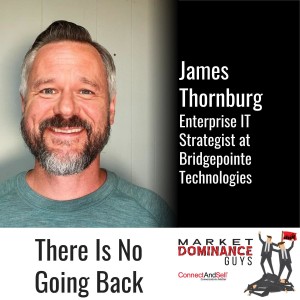
Tuesday Dec 28, 2021
EP114: There Is No Going Back
Tuesday Dec 28, 2021
Tuesday Dec 28, 2021
You may have heard the term “post-pandemic” bandied about in recent months, but there’s nothing “post” about the COVID pandemic yet: We’re still in the thick of it. It’s not all downside, though, as James Thornburg, Enterprise IT Strategist at Bridgepointe Technologies, and our Market Dominance Guys, Chris Beall and Corey Frank will tell you. In their third conversation together, they talk about the upside of the pandemic as it concerns sales. Because what is “post” for most salespeople is that bone-wearying business air travel, and the time-waste of business lunches, and the tedium and expense of that daily commute to and from the company office or to and from the offices of business prospects. The combination of cold calling by phone and discovery meetings by Zoom has made a new and successful world for salespeople, one that doesn’t require leaving home. Yes, you’ve heard of attempts to return sales to the pre-pandemic days, but as Chris predicts in this episode of Market Dominance Guys, “There Is No Going Back.”
About Our GuestJames Thornburg is the Enterprise IT Strategist at Bridgepointe Technologies, which offers a service that helps design IT and telecom projects for their clients and includes selecting the right supplier at the right price with no extra cost to their customers.
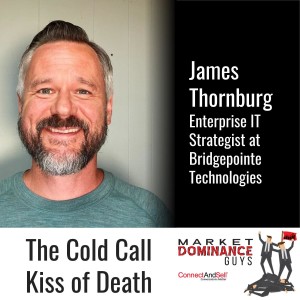
Tuesday Dec 21, 2021
EP113: The Cold-Call Kiss of Death
Tuesday Dec 21, 2021
Tuesday Dec 21, 2021
There’s a decided difference between the purpose of a cold call and that of a discovery call. During a discovery call, marketing language, also known as “selling your product or service,” is entirely appropriate. But if you foolishly use marketing language during your first conversation with a prospect — well, that, my podcast friends, is the cold-call kiss of death. Join these three successful cold-callers as they discuss the components of each type of call and warn you away from the two biggest cold-calling mistakes. James Thornburg, Enterprise IT Strategist at Bridgepointe Technologies, continues his conversation with our Market Dominance Guys, Chris Beall and Corey Frank, in order to provide you with some guidance about this important difference. Listen in to borrow from the best as these three professional salespeople lend you their expertise on this Market Dominance Guys’ episode, “The Cold-Call Kiss of Death.”
About Our Guest
James Thornburg is the Enterprise IT Strategist at Bridgepointe Technologies, which offers a service that helps design IT and telecom projects for their clients and includes selecting the right supplier at the right price with no extra cost to their customers.
Catch his previous episode here: Is Cold Calling a Form of Slapstick?
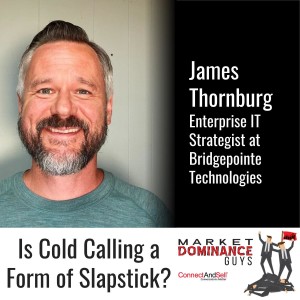
Tuesday Dec 14, 2021
EP112: Is Cold Calling a Form of Slapstick?
Tuesday Dec 14, 2021
Tuesday Dec 14, 2021
What makes a great cold caller? Our guest today on Market Dominance Guys, James Thornburg, Enterprise IT Strategist at Bridgepointe Technologies, defines the characteristics of a great cold caller as someone who puts in the hard work by having lots of conversations — and also has a little charisma. James uses humor and ConnectAndSell’s Lightning platform to connect to his prospects, and then shares his cold calls on LinkedIn for all to learn from — or be entertained by. Our hosts, Chris Beall and Corey Frank, are enthusiastic listeners, each touting the entertainment and educational value James provides with his cold-calling triumphs as well as his train wrecks. Listen in as these three sales guys discuss James Thornburg’s ability to “pivot to a chuckle” on this Market Dominance Guys’ episode, “Is Cold Calling a Form of Slapstick?”
About Our Guest
James Thornburg is the Enterprise IT Strategist at Bridgepointe Technologies, which offers a service that helps design IT or telecom projects for their clients and includes selecting the right supplier at the right price with no extra cost to their customers.

Wednesday Dec 08, 2021
EP111: Is Your Cold-Calling Technique Right On?
Wednesday Dec 08, 2021
Wednesday Dec 08, 2021
How’d you do on your last cold call? Can you detect when you’re off your game? Or are you still trying to figure out what techniques are needed to have a successful sales conversation? Jason Bay, Chief Prospecting Officer at Blissful Prospecting, has made teaching others to cold call successfully his life work. In this episode, he continues his two-part conversation as a guest on Market Dominance Guys with our hosts, Chris Beall and Corey Frank, as they discuss developing the techniques and self-awareness necessary in this job. They all agree it takes a fair amount of repetition to hone those sales skills, but you may be shocked to hear them say that just because you’ve been making cold calls for 20 years, doesn’t mean you’re good at it. Take some time out to check your skills against the ones that Jason, Chris, and Corey propose in this Market Dominance Guys’ episode “Is Your Cold Calling Technique Right On?”
About Our Guest
Jason Bay is Chief Prospecting Officer at Blissful Prospecting. He helps reps and sales teams who love landing big meetings with prospects but hate not getting responses to their cold emails or feeling confident making cold calls.

Tuesday Nov 30, 2021
EP110: Your Tone of Voice Tells All
Tuesday Nov 30, 2021
Tuesday Nov 30, 2021
Did you know that, during a cold call, your tone is more important than the words you use? Who would have guessed that tonality ranks higher than the message you so carefully crafted? Jason Bay, Chief Prospecting Officer of Blissful Prospecting, joins our Market Dominance Guys, Chris Beall and Corey Frank, to talk about this very thing: how a sincere tone communicates authenticity, which is so important when attempting to connect with your prospect. The guys also discuss how preparing and practicing cold calls can put you at ease enough that you are then able to concentrate on listening to the other person in the call — your prospect! According to Jason, “If you really listen to your prospect’s tonality, you’ll hear what they are thinking but not saying. But you’ve got to be so used to delivering your message that you’re not thinking much about what you’re going to say.” That way, you can really be tuned into the other person. We’d like to suggest you tune into this Market Dominance Guys’ episode to learn even more about how “Your Tone of Voice Tells All.”
About Our GuestJason Bay is Chief Prospecting Officer at Blissful Prospecting. He helps reps and sales teams who love landing big meetings with prospects but hate not getting responses to their cold emails or feeling confident making cold calls.

Tuesday Nov 23, 2021
EP109: Being There for Your Customers
Tuesday Nov 23, 2021
Tuesday Nov 23, 2021
Can you truly say that you’re always on your customer’s side? Matt McCorkle, Manager of Branch Operations for Kaeser Compressors, can. At Kaeser, providing support for the products they sell is everything, explains this week’s guest on Market Dominance Guys. “It’s always about the customer,” Matt states. In this third of three conversations between Matt and our hosts, Chris Beall, and Corey Frank, the discussion centers on being 100% committed to supporting customers — those who have put themselves in your hands because you’ve convinced them to trust you. Corey explains that this starts with that first conversation, the cold call. “You are the product that builds trust first,” he says. “The actual product you’re selling comes second.” Join our three sales experts on this week’s Market Dominance Guys’ episode, “Being There for Your Customers.”
About Our Guest
Matt McCorkle is Manager of Branch Operations for Kaeser Compressors. He has earned both a bachelor’s degree and a master’s degree in mechanical engineering and has now been with Kaeser Compressors for 13 years.

Tuesday Nov 16, 2021
EP108: Sales and the State of Apprehension
Tuesday Nov 16, 2021
Tuesday Nov 16, 2021
Nobody likes to be told what to do. But in sales that’s exactly what we do: We tell our prospects what to do. With each cold call or discovery call, we’re basically saying, “Buy this!” No wonder prospects on the receiving end of a sales call feel apprehensive and try to end the call quickly! Matt McCorkle, Manager of Branch Operations for Kaeser Compressors, joins our Market Dominance Guys, Chris Beall and Corey Frank, for a dissection of this sales problem. How do you take a prospect from that state of apprehension, where they fear they’re going to be sold to, and get them to a state of pride, where they are comfortable enough to share their company’s pain and open the door to true discovery? Join Matt, Chris, and Corey as they talk turkey on this Market Dominance Guys’ episode, “Sales and the State of Apprehension."
About Our Guest
Matt McCorkle is Manager of Branch Operations for Kaeser Compressors. He has earned both a bachelor’s degree and a master’s degree in mechanical engineering and has now been with Kaeser Compressors for 13 years.
Listen to the next installment of this interview with Matt McCorkle
Being There for Your Customers
And the first one -
EP107: On the Phone, They’ll Tell You the Truth!
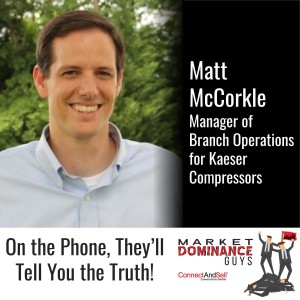
Tuesday Nov 09, 2021
EP107: On the Phone, They’ll Tell You the Truth
Tuesday Nov 09, 2021
Tuesday Nov 09, 2021
Coming from a background in mechanical engineering, Matt McCorkle, Manager of Branch Operations for Kaeser Compressors, is very interested in how sales works. He has always believed in the power of the telephone as a selling tool, so when he learned about ConnectAndSell’s sales-acceleration platform from our Market Dominance Guy, Chris Beall, Matt immediately saw how he could use the telephone to increase Kaeser’s market share. “Matt was so curious, unlike many people in sales,” Chris says. Curious about how to get future appointments, how to coach coaches, how long onboarding takes, and about why face-to-face sales is different from phone sales. In this episode of Market Dominance Guys, Corey Frank and Chris learn what Matt has figured out: In face-to-face sales, he says, “people like you to leave feeling that they like you, and you like them, and everything’s okay, so they’re not really telling you the truth.” But — as the title of today’s episode of Market Dominance Guys states — “On the Phone, They’ll Tell You the Truth!” Tune in to hear our Guys’ and Matt’s view on dominating your market through the awesome power of well-orchestrated and professionally coached cold calls.

Tuesday Nov 02, 2021
EP106: The Impact of the Human Voice
Tuesday Nov 02, 2021
Tuesday Nov 02, 2021
If we train our salespeople to use data and devise probing questions that sort out which prospects are worth their time, is our main instruction to reps, “Go for the disqualification jugular vein!”? How’s that working for you? Santosh Sharan, president, and COO of Apollo.io joins our Market Dominance Guys, Chris Beall, and Corey Frank, in part three of their three-part conversation about the roles of technology and data in cold calling, and the necessity of training the human voice to do more than disqualify prospects. Santosh explains, “Sales reps depend on technology so much that they don’t take time to do research and take a look at conversations strategically.” Chris and Corey both concur: To be a good talker and listener in a sales setting, training is essential, and the goal of that training should be gaining the buyer’s trust through the use of a great script and “The Impact of the Human Voice,” which is the title of today’s Market Dominance Guys’ episode.
Listen to the previous segments of this interview:
EP105: Data & Trust: Your Assets in Market Domination
EP104: The Increasing Atomic Weight of Data
About Our Guest
Santosh Sharan, president and COO at Apollo.io, a leading data intelligence and sales engagement platform. Previously, Santosh was COO at LeadGenius, COO at Aberdeen, and VP at ZoomInfo.

Tuesday Oct 26, 2021
EP105: Data & Trust: Your Assets in Market Domination
Tuesday Oct 26, 2021
Tuesday Oct 26, 2021
Sales and marketing departments usually operate as two separate entities. Although that’s not healthy for a business, it’s generally the reality in many companies. Santosh Sharan, president and COO of Apollo.io, joins our Market Dominance Guys, Chris Beall and Corey Frank, in this second of three conversations, to talk about the evolution of data as a business asset and how shared data — and unified leadership — can eliminate this unfortunate dichotomy of purpose, and fuse sales and marketing into one weapon with a single goal: market domination. “Sales is simple,” Santosh says, “You’re looking for an edge over your competitors.” It used to come primarily from developing relationships, which Chris defines as gaining your prospect’s trust. Now, though, getting the desired information or data to an interested prospect provides an increasingly important edge — if you can do it faster than your competitors can. And, thus, data joins trust as a necessary tool of sales. Learn more about this and other data- and sales-related insights in today’s Market Dominance Guys’ episode, “Data & Trust: Your Assets in Market Domination.”
Listen to the previous and next parts of this interview
EP106: The Impact of the Human Voice
EP104: The Increasing Atomic Weight of Data
About Our Guest
Santosh Sharan, president and COO at Apollo.io, a leading data intelligence and sales engagement platform. Previously, Santosh was COO at LeadGenius, COO at Aberdeen, and VP at ZoomInfo.

Wednesday Oct 20, 2021
EP104: The Increasing Atomic Weight of Data
Wednesday Oct 20, 2021
Wednesday Oct 20, 2021
Sales used to be considered a trick done by salespeople, but success in sales today relies more and more on collecting information, analyzing the resulting data, and then using it to finetune your sales department’s approach to prospects. Santosh Sharan, president and COO of Apollo.io joins our Market Dominance Guys, Chris Beall, and Corey Frank, in this first of three conversations about instrumentation that collects data and how careful analysis can help make sense of that data in order to provide guided intelligence to sales teams. Join these three sales-minded experts as they walk you through what to do with all the data you collect in this week’s Market Dominance Guys’ episode, “The Increasing Atomic Weight of Data.”
About Our Guest
Santosh Sharan, president and COO at Apollo.io, a leading data intelligence and sales engagement platform. Previously, Santosh was COO at LeadGenius, COO at Aberdeen, and VP at ZoomInfo.

Wednesday Oct 13, 2021
EP103: What Do You Do With an Addressable Market?
Wednesday Oct 13, 2021
Wednesday Oct 13, 2021
Is the goal of each member of your sales team to dominate your company’s market? Or is their goal to make their sales quotas? According to our Market Dominance Guy, Chris Beall, it should be “Dominate or die!” This week, Chris shares with our podcast audience a Selling Power webinar he calls “How to Achieve Market Dominance,” in which he details the steps necessary to do just that: dominate your market! In this first part of a three-part series, Chris defines the terms “market” and “addressable market,” and then goes on to explain precisely what information you need to obtain from your addressable market prospects when you have a conversation with them. Using a clear and organized approach, Chris will lead you to an understanding of this week’s Market Dominance Guys’ topic, “What Do You Do With an Addressable Market?” As usual, you’ll walk away from this how-to guide with insights and strategies to help your company on its way to dominating its market.
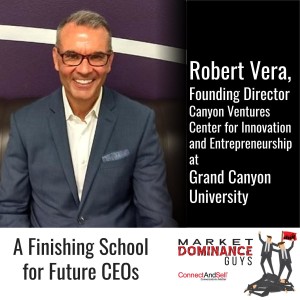
Tuesday Oct 05, 2021
EP102: A Finishing School for Future CEOs
Tuesday Oct 05, 2021
Tuesday Oct 05, 2021
Driving revenue is what keeps a startup company in the hands of its founders, instead of in the grasp of a venture capital firm. That’s what Canyon Ventures Center for Innovation and Entrepreneurship is all about: teaching founders how to sell their own product or service to get that revenue rolling in. Robert Vera, founding director of this Grand Canyon University center, is proud of the success of the founders he has been mentoring. During this second part of their two-part conversation, our Market Dominance Guys, Chris Beall, and Corey Frank talk with Robert about the importance of his program. “It’s only by selling that we learn how our business is really working,” explains Chris. Those selling conversations with prospects give startup founders the information necessary to fine-tune their products and services so they can dominate their market. Here on Market Dominance Guys, we try to do much the same thing: For 100 episodes now, Chris, Corey, and their guests have helped our listeners finetune their businesses so they can dominate their markets. At the end of today’s episode, Chris and Corey applaud a couple of stand-out guests who have generously shared their insights on this podcast. Like Robert Vera’s program, Market Dominance Guys is also — just as the title of this episode states — “A Finishing School for Future CEOs.”
Episodes mentioned by Chris and Corey as two of their favorites:
EP7: Don‘t Make the Spiders Angry
EP75: The Secret of Her Success
EP76: I Heart No Shows!
About Our Guest
Robert Vera is a bestselling author and the founding director of Canyon Ventures Center for Innovation and Entrepreneurship at Grand Canyon University in Phoenix, Arizona.
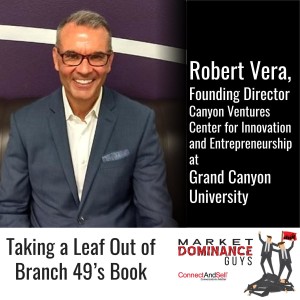
Wednesday Sep 29, 2021
EP101: Taking a Leaf Out of Branch 49‘s Book
Wednesday Sep 29, 2021
Wednesday Sep 29, 2021
One of the major challenges of getting a startup up and running is doing a lot of things you don't know how to do. How are you going to learn to do them? Enter Robert Vera, founding director of Canyon Ventures Center for Innovation and Entrepreneurship at Grand Canyon University, and today’s guest on Market Dominance Guys. Mentoring a portfolio of 32 startup companies that are beyond the ideation stage, the Center's goal is to accelerate the growth of each company by coaching them, at no cost, in selling their product and generating cash flow. The program’s one caveat? Each company must hire Grand Canyon University students and give them professional sales experience prior to graduation. Our own Market Dominance Guy, Corey Frank, helps to provide that successful selling experience with his company, Branch 49, a sales acceleration software and service that uses AI to score leads, dramatically increasing conversations-to-meeting rates. Intrigued? Find out more about how to grow your startup on today's Market Dominance Guys' episode, "Taking a Leaf Out of Branch 49' book."
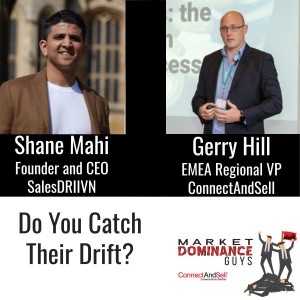
Wednesday Sep 22, 2021
EP100: Do You Catch Their Drift?
Wednesday Sep 22, 2021
Wednesday Sep 22, 2021
Are you providing your reps with excellent sales training only to find that most of them drift slowly back to their old behavior? In today’s podcast, Gerry Hill, Regional VP/EMEA of ConnectAndSell, and Shane Mahi, Founder and CEO of SalesDRIIVN, join our Market Dominance Guy, Chris Beall, to discuss the solution to sales rep drift. Using the analogy of machinery that drifts out of tolerance and requires maintenance for necessary adjustments, the guys discuss the necessity and effectiveness of sales coaching in real-time. The solution’s success hinges on catching and correcting those little (or big) errors in message, tone, and pacing before your reps run through your lists and have nothing to show for it. Vigilance and just-in-time coaching: All that and more on today’s Market Dominance Guys’ episode, “Do You Catch Their Drift?”
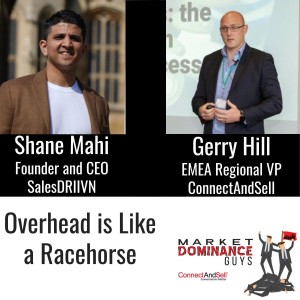
Tuesday Sep 14, 2021
EP99: Overhead Is Like a Racehorse
Tuesday Sep 14, 2021
Tuesday Sep 14, 2021
What’s the most efficient, most secure method of growing your company? Shane Mahi, Founder and CEO of SalesDRIIVN, and Gerry Hill, EMEA Regional Vice President of ConnectAndSell, explore this question with Chris Beall in today’s Market Dominance Guys’ podcast. “Overhead is like a racehorse,” Chris says. “It eats while we sleep.” He offers the following advice to Shane and to our loyal listeners: Forget taking money from VCs. Instead, work on shortening your pitch-to-value cycle time and build your business that way. “The faster your company can cycle and produce value,” he explains, “the lower your risk of losing your business.” Gerry chimes in with his own great advice: “Be sure to take a scientific approach to the experiment, not an emotional approach.” And, as always, Chris reminds those pursuing success in business that “Market dominance is a risk-reduction program: in order to reduce the risk of losing your company, you need to dominate one market. Then go dominate another.” That’s the way we roll on Market Dominance Guys every day: lots of valuable advice and helpful reminders. Listen in for more of it on today’s episode, “Overhead Is Like a Racehorse.”

Wednesday Sep 08, 2021
EP98: Is Venture Capital for You?
Wednesday Sep 08, 2021
Wednesday Sep 08, 2021
How did you get started in sales? And what led you to the position you now hold and the company you are currently involved with? Shane Mahi, Founder and CEO of SalesDRIIVN, and Gerry Hill, EMEA Regional Vice President of ConnectAndSell, are asked these very questions by our Market Dominance Guy Chris Beall in today’s podcast. Surprisingly, a common answer emerges to the first question: both guests, as well as our host, took their first step into the sales world by selling products door to door — and doing so successfully. Our guests describe the steps that subsequently led them to where they are today, and this leads to a discussion with Chris about funding new companies and the temptation and possible pitfalls of taking venture money to facilitate growth. Follow their conversation in this first of three meetings of the minds on today’s Market Dominance Guys’ episode, “Is Venture Capital for You?”
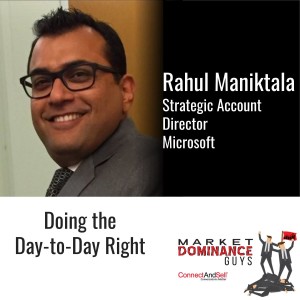
Wednesday Sep 01, 2021
EP97: Doing the Day-to-Day Right
Wednesday Sep 01, 2021
Wednesday Sep 01, 2021
Could you name that one all-important thing that makes your relationship with your customers successful? Rahul Maniktala, Microsoft’s Strategic Account Director of Semi/Hi-Tech Manufacturing, can: As he tells our Market Dominance Guys, Chris Beall and Corey Frank, that all-important thing is “doing the day-to-day right.” Why? Because it daily reinforces the trust your customers feel for you and your company, which incrementally builds the credibility of your services and products. And with that credibility in place, you have a decent shot at an agreement with your customer when you propose bigger, more important initiatives. Take a listen to more insights shared by Rahul, who has been a Microsoft employee for eight years, as he explains the culture of collaboration at his company, whether he stands with human intelligence predictions or artificial intelligence predictions, and what job he wanted to do when he was a 10-year-old, on today’s Market Dominance Guys’ episode, “Doing the Day-to-Day Right.”
Listen to the first half of this two-part interview:
Empathy, Goals, and Alignment of Purpose
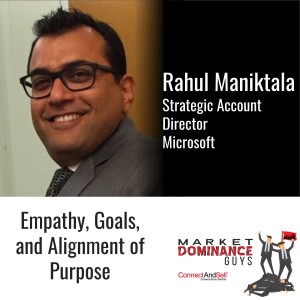
Wednesday Aug 25, 2021
EP96: Empathy, Goals, and Alignment of Purpose
Wednesday Aug 25, 2021
Wednesday Aug 25, 2021
What if you only had one account to sell to? One with a $100-million budget and a quarter of a million employees? Rahul Maniktala, Microsoft’s Strategic Account Director of Semi/Hi-Tech Manufacturing has that very job. He’s today’s guest on Market Dominance Guys, and Chris Beall and Corey Frank are curious about how Rahul goes about dominating his market of one. “Behind me is the might of Microsoft,” he explains, and the culture there lends itself very well to support for their customers. In addition, Rahul’s background in technical expertise and an understanding of high-tech products, which is the basis of his customer’s business, helps him gain an understanding of what his customer wants to accomplish. After that, “[t]here are a lot of people you have to align,” Rahul explains to Chris and Corey. He always starts with the customer, employing empathy in order to understand their goals, and then works with the people at Microsoft to create an alignment of purpose between the goals of this company he works for and the goals of the customer he serves. It’s a balancing act, and one that Rahul is very adept at, as you’ll learn in today’s Market Dominance Guys’ episode, “Empathy, Goals, and an Alignment of Purpose.”
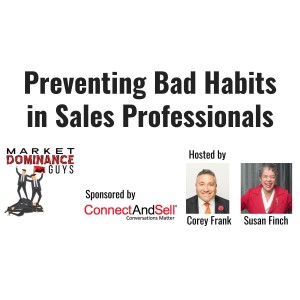
Tuesday Aug 17, 2021
EP95: Not Getting Trained? Train Yourself.
Tuesday Aug 17, 2021
Tuesday Aug 17, 2021
How do you improve your cold calling skills if your present company isn’t providing any sales training? Train yourself! Until you can get with the right company, borrow ideas from the best sales experts you can find (many have been guests on this podcast), take improv classes, join Toastmasters, and keep your mind open to absorb what works. Our Market Dominance Guy Corey Frank is talking in more depth about training yourself during this second part of his conversation with Susan Finch, president of Funnel Media and Funnel Radio. He advises listeners that salespeople should fall in love with their craft — not the product they’re selling. How do you do that? Care about the potential value of the meeting for your prospect and remember the “why” of what you’re doing. And what skills should you hone? Learn what moves prospects to make a decision, create a well-written script and adhere exactly to it, use the tone of voice that elicits the response you want, and most importantly, leave your own mood and ego behind when you make a cold call. Train yourself to remember that it’s not about you. When you place a call, it’s showtime!
Listen to the first half of this interview here:
Are You Laying Brick, or Making $12 an Hour?

Wednesday Aug 11, 2021
EP94: Are You Laying Brick, or Making $12 an Hour?
Wednesday Aug 11, 2021
Wednesday Aug 11, 2021
What good is a salesperson with five years' experience if they've never been trained and have a hopscotch career of many short stops at companies that never invested in training their sales teams? Corey tells the old story, "A guy walks past a construction site and sees five people laying brick. And he goes to the first guy and says, "Hey, what are you doing?" He's like, "Building a wall." Goes to the second guy, "What are you doing?" And he's like, "Making 12 bucks an hour." Listen to the rest as Corey Frank and Susan Finch, president of Funnel Media Group and Funnel Radio, go on without Chris Beall this week and talk about the concept behind Branch49, a sales acceleration software and service that uses AI to score leads based on their preferred contact channels, while also dedicating a sales team to perform top-of-funnel and full-stack revenue generation. They discuss the obligation that companies have to ensure sales professionals are trained correctly and with the good of the prospect and customer at the forefront, how to undo bad sales habits, and how to help sales professionals who were never trained prepare to work for honorable companies who value sales skills. This is part one of a two-part interview.
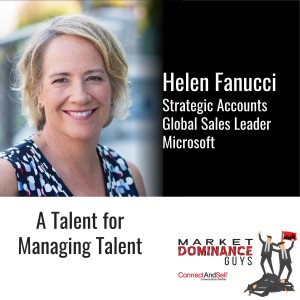
Wednesday Aug 04, 2021
EP93: A Talent for Managing Talent
Wednesday Aug 04, 2021
Wednesday Aug 04, 2021
On Market Dominance Guys, Chris Beall continues his two-part conversation with his fiancée, Helen Fanucci, Microsoft’s Strategic Accounts Global Sales Leader. Today, they’re talking about how work-from-home experiences have resulted in a shift in employees’ attitudes about where and when they are willing to work. This is Helen’s area of expertise: She’s been managing employees remotely for 15 years, helping them grapple with their work-from-home issues. Additionally, she understands the challenges of attracting and retaining the best people, especially in today’s job market. Microsoft’s customers demand great service and support, and, Helen says, “That’s why we have to win the war to get talent. We have to keep serving our customers with amazing talent, or they’ll find somebody else who will.” And once you’ve hired talented people, how do you keep them? “Through servant leadership,” Helen explains. Describing her role as a manager at Microsoft, she says, “I am expected to model and coach, be inclusive, take accountability. I remove the blocks and barriers so that my team can achieve.”

Wednesday Jul 28, 2021
EP92: Will They Stay or Will They Go?
Wednesday Jul 28, 2021
Wednesday Jul 28, 2021
This week on Market Dominance Guys, Chris Beall is once again flying solo while Corey Frank is out traveling the world. Chris’ guest today is Helen Fanucci, Strategic Accounts Global Sales Leader at Microsoft — and Chris’ fiancée! The topic today veers away from competing with other companies for market domination, to competing with other companies for market talent. It’s just another result of our almost year and a half of working from home due to the pandemic: People now want flexibility in where they work and when they work.

Tuesday Jul 20, 2021
EP91: Borrowing from the Best
Tuesday Jul 20, 2021
Tuesday Jul 20, 2021
This week’s Market Dominance Guys’ podcast wraps up a terrific three-part conversation between our guys, Chris Beall and Corey Frank, and their guest, Henry Wojdyla, Founder and Principal of RealSource Group. Today, Corey asks Henry how he’s finetuned his business perspective and cold-calling technique since his recent immersion in Market Dominance Guys. “I copy and steal religiously,” Henry freely confesses. “I’ve wholesale stolen Chris’ approach.”

Wednesday Jul 14, 2021
EP90: Lead That Cold Call With Trust, Not Value
Wednesday Jul 14, 2021
Wednesday Jul 14, 2021
This week, our Market Dominance Guys, Chris Beall, and Corey Frank are into part two of their three-part conversation with Henry Wojdyla, Founder and Principal of RealSource Group. And what a conversation it is! Chris was surprised to discover Henry had binge-listened to every Market Dominance Guys’ podcast in one weekend. You might wonder why the rush until you hear the questions Henry was wrestling with while attempting to finetune his business: “How can I systematize what I’m doing?” “How can I maximize the efficacy of the sales practitioner?” “How can we create systems that are somehow universal?” Right here on Market Dominance Guys, Henry found what he was looking for!

Wednesday Jul 07, 2021
EP89: When the Student Is Ready, the Teacher Will Appear
Wednesday Jul 07, 2021
Wednesday Jul 07, 2021
This week, the Market Dominance Guys’ dynamic duo of Chris Beall and Corey Frank are back together again, talking with Henry Wojdyla, the dynamic Founder and Principal of RealSource Group. His company’s special business niche? The direct acquisition of healthcare facilities, particularly medical offices and surgical centers around the country. Recently, Henry was introduced to ConnectAndSell’s sales-acceleration system, and from there, he discovered Chris’ blogs and then this podcast. He is now taking the theories and techniques of marketing domination, which he learned from listening to every Market Dominance Guys’ episode and employing them to dominate his own market.

Wednesday Jun 30, 2021
EP88: Get Thee to a Data Concierge.
Wednesday Jun 30, 2021
Wednesday Jun 30, 2021
This week, our Market Dominance Guy, Chris Beall, is again flying solo as he continues his conversation with business intelligence engineer Tom Zheng, an expert in the field of data analysis. Explaining the importance of a data-related topic to this podcast audience, Chris points out, “Everybody who is used to Market Dominance Guys knows we talk sales, sales, sales. But because sales generate a lot of numbers, you need a data concierge to take that information and help you generate potential insights.” As a CEO, Chris is currently using a data concierge to analyze all the numbers his company generates and to make sense of the results. What works best, he says, is to tackle this process one-on-one — the CEO and data concierge only — in order to eliminate company politics.

Tuesday Jun 22, 2021
EP87: Giving Your Data the Sniff Test
Tuesday Jun 22, 2021
Tuesday Jun 22, 2021
Our Market Dominance Guy, Chris Beall, is flying solo again this week as he meets with data guru Tom Zheng. Tom is a business intelligence engineer and works as an independent contractor in the field of data analysis. In other words, he spends his days making sense out of those large quantities of data that tend to pile up in businesses. As CEO of ConnectAndSell, Chris uses Tom’s data analysis services to guide him through the often-confusing pathways that data can create. As Chris says, because data is kept in ways that are not always optimal for analysis, business leaders need people like Tom to help make sense of it, so they’ll know if they’re dominating their market or not, or if they’re making or losing money on different parts of their business.
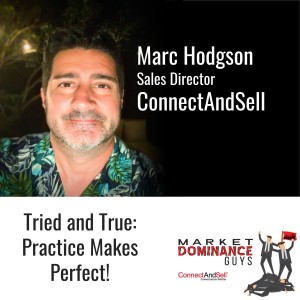
Tuesday Jun 15, 2021
EP86: Tried and True: Practice Makes Perfect
Tuesday Jun 15, 2021
Tuesday Jun 15, 2021
This week on Market Dominance Guys, Chris Beall and Corey Frank continue their interview with Marc Hodgson, sales director at ConnectAndSell. What’s the topic? How to get the most out of a first conversation. As Marc says, “All the magic happens inside the conversation,” getting your prospect from fear to trust and then on to curiosity. But how do you take a green SDR — or even a fairly well-seasoned one — and develop the skills that get them to the level where the magic happens?
As Chris and Corey have discussed in previous episodes, first you need to have a clear idea of what the purpose of that initial conversation is: You’re not trying to sell anything but the discovery meeting. And to do that, you need to truly believe in the value of that meeting for the person you’re talking with. Once you have that belief firmly in place, it’s time to develop your skills, which start with learning a great script and how to deliver it in the right tone and with the correct pacing. After that, practice, practice, practice. As Marc explains, “It’s not enough to do it. Now you have to get really great at it. You’ve got to be frequent before you can get good.” As usual on the Market Dominance Guys, you’ll hear this and lots more sage advice on today’s episode, “Tried and True: Practice Makes Perfect!”
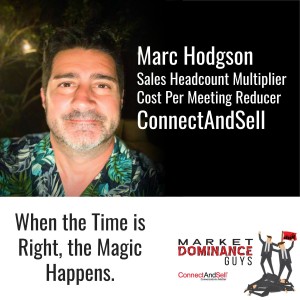
Wednesday Jun 09, 2021
EP85: When the Time Is Right, the Magic Happens
Wednesday Jun 09, 2021
Wednesday Jun 09, 2021
The Market Dominance Guys, Chris Beall and Corey Frank, had a meeting of the minds this week with Marc Hodgson of ConnectAndSell, who proudly claims the titles of Sales Headcount Multiplier and Cost Per Meeting Reducer. Chris introduces Marc as a learner, a student of the craft of selling, and a delight to work with. As Chris says, “With Marc there’s no bravado, no sales-jock stuff.” Marc is what’s known as a “long-game player,” spending his work days building relationships with prospects, not pushing for an immediate sale.
He credits fellow ConnectAndSell salesperson John Jackson with being his long-player model. As Marc explains John’s sales approach, “[He] talks to a prospect three or four times a year … and when they’re ready to buy, they buy from John.” The phrase, “Conversations matter,” is the basic tenet of ConnectAndSell, and Marc explains his adoption of it this way: “It takes time to build relationships. I have that core belief that there’s going to be value in the conversation. We’re going to learn together.” You can learn more about being a long-game player in this week’s Market Dominance Guys’ episode, “When the Time Is Right, the Magic Happens.”
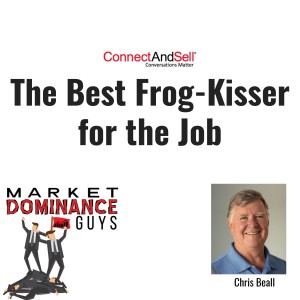
Tuesday Jun 01, 2021
EP84: The Best Frog-Kisser for the Job
Tuesday Jun 01, 2021
Tuesday Jun 01, 2021
On our podcast this week, our Market Dominance Guy, Chris Beall, is flying solo with an episode about selecting the best SDR to have discovery conversations with senior-level prospects. You might subscribe to the “cheaper cold callers are better” mindset, but Chris presents some well- thought-out reasons to put your money where your telephone’s mouthpiece is. That’s right — once again, Market Dominance Guys is asking you to look at the scary spot — cold calls — and rethink what would work best. Chris’ contention is that people holding senior-level positions are much more likely to respond to and connect with someone who has the same level of experience or background they have.
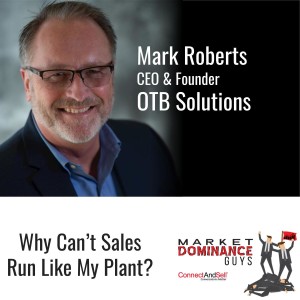
Tuesday May 25, 2021
EP83: Why Can’t Sales Run Like My Plant?
Tuesday May 25, 2021
Tuesday May 25, 2021
In this week’s episode of Market Dominance Guys, you’ll get to listen in on part 2 of the conversation between our own Market Dominance Guy, Chris Beall, and our guest, Mark Roberts, CEO, and founder of OTB Solutions. These two experts hold the same unfaltering belief about the importance of the first conversation a sales rep has with a prospect: they’ve learned that the cold caller has to believe in the potential value of the discovery meeting they are offering in order to be successful at setting that meeting.
Mark works as a consultant with CEOs of manufacturing companies, many of whom have voiced the lament, “Why can’t my sales department run like my plant?” Mark thinks that sales really can be a science. “There are dollars in your data if you know where to look,” he says. So, how do you get a CEO to say, “Oh! Belief really does count!”? Show them the numbers. Chris and Mark know that every time a CEO listens in on his reps’ sales calls during one of ConnectAndSell’s intensive test drives, they can easily discern the difference between reps who believe in the value of the meeting and reps who don’t — just by looking at the conversation-to-meeting ratio. They can see what “good” looks like and how much fun reps have when they are successful. Marks explains it like this: “Belief, worthy intent, and fun change the quality of the rep’s output. These things that sound ‘squishy’ are the bedrock of success.” And bringing market dominance to worthy manufacturers is the bedrock of this episode of Market Dominance Guys, “Why Can’t Sales Run Like My Plant?”
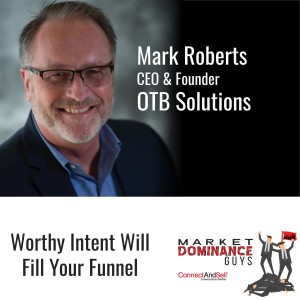
Tuesday May 18, 2021
EP82: Worthy Intent Will Fill Your Funnel
Tuesday May 18, 2021
Tuesday May 18, 2021
Today on Market Dominance Guys, Chris Beall has a discussion about first conversations with Mark Allen Roberts, CEO, and founder of OTB Solutions. Mark and Chris compare notes on how things were in the “old days” of sales, back in the 1980s when they got started in this area of business. Mark recalls that in the old days, you weren’t allowed to go out and sell until you were trained. Nowadays, though, most salespeople aren’t trained. Many don’t even know the purpose of the call they’re making: Their knee-jerk reaction to getting someone on the phone is to immediately start pitching their product. And so, they totally miss the opportunity to use the first 7 seconds of a conversation to establish trust and, thus, begin a relationship that may eventually lead to setting a meeting or making a sale.
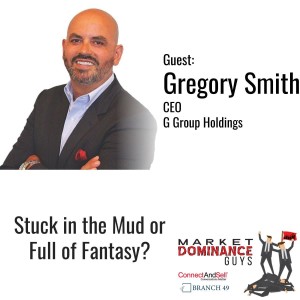
Wednesday May 12, 2021
EP81: Stuck in the Mud or Full of Fantasy
Wednesday May 12, 2021
Wednesday May 12, 2021
Welcome to another episode of Market Dominance Guys with Chris Beall and Corey Frank. Today, our guys continue exchanging ideas with Gregory Smith, CEO at G Group Holdings. In this third part of their discussion, they talk about the view from a CEO’s desk. Chris, who is himself a CEO, thinks that most chief executive officers’ view of their company is often skewed by the remove at which they look at its operations. As he puts it, “They tend to be either stuck in the mud or full of fantasy.” Greg and Chris then reveal that they are both true believers in C-level staff getting out on the frontline and experiencing the jobs their employees do.

Tuesday May 04, 2021
EP80: Why “the Why” Is So Essential
Tuesday May 04, 2021
Tuesday May 04, 2021
In this Market Dominance Guys’ episode, Chris Beall and Corey Frank continue their conversation with Gregory Smith, CEO of G Group Holdings. They’re talking today about talent acquisition and development, which Greg says is about 60–80% of most companies’ expenses — and could be one of the significant reasons why some businesses don’t grow. He believes that a company is only as good as its people and the way its people treat customers. With the goal of inspiring his own team to reach for that high customer-service bar, Greg explains his approach in this way: “I’m a coach, I’m a mentor, and I appropriate the resources my team needs to be rock stars.”

Tuesday Apr 27, 2021
EP79: One and Done Is the Loneliest Number
Tuesday Apr 27, 2021
Tuesday Apr 27, 2021
Today, our Market Dominance Guys, Chris Beall and Corey Frank, interview Gregory Smith, CEO, G Group Holdings. Corey introduces Greg as an “M&A whisperer,” which Greg lives up to as he reveals insights gleaned from his work with mergers and acquisitions. How can he tell if a company is going to survive and thrive? Greg says that he begins with two questions: “Does your company’s product or service fill a particular niche? And does your product or service solve a specific problem for customers?” Greg then warns our podcast listeners against being a “one product or service — and done” business. As he explains it, you can occupy a great niche and have a fabulous customer solution, but you need to continue to develop and augment what you’re offering. He illustrates his point with an example from Starbucks’ early days in business and then goes on to tell a cautionary tale of a company that pioneered bacon-infused vodka.
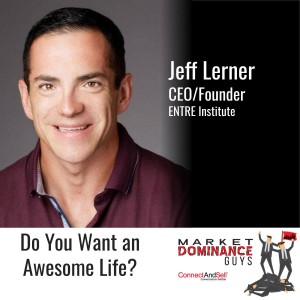
Tuesday Apr 20, 2021
EP78: Do You Want an Awesome Life?
Tuesday Apr 20, 2021
Tuesday Apr 20, 2021
In today’s episode of the Market Dominance Guys, Chris Beall and Corey Frank continue their conversation about the unifying convergence of B2B and B2C sales tactics with Jeff Lerner, CEO and founder of Entre Institute. The product Jeff’s company offers its customers is empowerment for people wanting to have a better, more successful life. As he explains it, “Everyone wants an awesome life. There's nothing special about wanting one, but defining your awesome life and executing on a strategic plan to create it, regardless of personal circumstances, is something most don't ever do. You have to be committed to excellence.”
In talking about why excellence isn’t pursued by most people, Chris explains, “Excellence is a form of exile from the community they grew up in — in which people mostly complained about how bad things are in their lives.” Jeff simplifies the process of switching from complaining to pursuing an “awesome” life with his offer of Entre’s blueprint, which lays out three areas of concentration — personal, professional, and physical — which he has named the "3 Ps.” Listen to Chris, Corey, and Jeff discuss the 3Ps, plus the particulars of how Jeff dominates his market using social media videos, and how that B2C approach correlates with the Market Dominance Guys’ B2B approach of “conversations first” on today’s episode, “Do You Want an Awesome Life?”
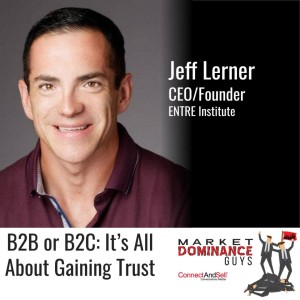
Tuesday Apr 13, 2021
EP77: B2B or B2C: It’s All About Gaining Trust
Tuesday Apr 13, 2021
Tuesday Apr 13, 2021
Up to now, our Market Dominance Guys, Chris Beall and Corey Frank, have used this podcast as a platform addressing the topic of how to dominate B2B markets. But today, the guys are interviewing Jeff Lerner, founder, and CEO of Entre Institute, about the process he employs to dominate a B2C market. By placing daily video messages on social media about himself, his life, and his goal to help people improve their lives, Jeff proves to his prospects that he is a person they can identify with and, eventually, a person they can trust. It’s not as quick as a cold call: Jeff says it takes about six months of exposure to his messages before skepticism is diminished in his prospects’ minds and they trust him enough to be open to what his company offers.
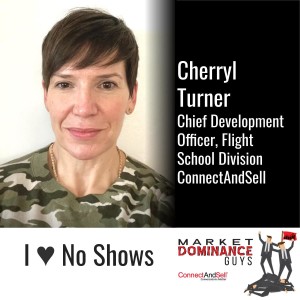
Wednesday Apr 07, 2021
EP76: I Heart No Shows.
Wednesday Apr 07, 2021
Wednesday Apr 07, 2021
On this week’s episode of Market Dominance Guy, Chris Beall continues his conversation with Cherryl Turner, Chief Development Officer of ConnectAndSell’s newest division, Flight School. Together they talk about why it is that of the four sales outcomes — Yes, No, Not me, or Not now — the response that dominates is “Not now.” As Chris explains, “It’s the nature of life.” People are busy. Things come up. Priorities shift. But when a prospect says, “Not now,” what’s a sales rep to do? Push harder and try to squeeze his pitch into the conversation anyway? Or should he relax and bow to the prospect’s protestations that it’s a bad time to talk, by graciously saying, “No problem. I’ll give you a call next week.” It’s an unusual reaction in the high-pressure world of “Make that sale,” but this may be one of the keys to Cherryl’s success in her career: as Chris says, she handles the rigors of cold calling with grace.
It also takes grace to handle the frustration of a no-show. But Chris’s surprising reaction to a cancelled appointment is, “I heart no-shows! They’re my favorite thing in business!” A no-show, he says, makes the relationship more real, because now it’s less perfect. It creates a more-even footing for the next conversation, as well as an opening for a prospect to reveal an insight or two about his business as he explains the why behind his missed appointment. So, when a rep or AE is faced with a no-show and is able to relax and say, “Hey, I understand. I’ll call you back later so we can find a time that will work better for you,” then that improves what Cherryl calls the “trust-o-meter.” She has learned that being persistent with call-backs to “Not now’s” and “No shows” lets her prospects know that she believes in the potential value of what she is selling. And you can believe me when I say, you’re going to want to hear every minute of this week’s episode of Market Dominance Guys, “I Heart No-Shows!”
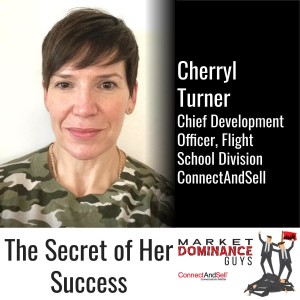
Wednesday Mar 31, 2021
EP75: The Secret of Her Success
Wednesday Mar 31, 2021
Wednesday Mar 31, 2021
In this week’s Market Dominance Guys’ podcast, Chris Beall conducts a solo interview with Cherryl Turner, Chief Development Officer of ConnectAndSell’s new Flight School Division. In the first episode of this two-part conversation, Cherryl relays to Chris how she got started in cold calling and about the important experiences she had talking with prospects — experiences that helped shape how she approaches cold calls and conducts meeting-setting conversations today.
As an example, Cherryl recounts a pivotal moment during a call with a prospect, in which she had the impulse to stop talking and just listen — instead of pushing to make the sale — and how the whole tone of the conversation warmed up after that. This was a career changer for her! Chris alludes to this when he describes Cherryl, touting her practice of conversing with each prospect as a peer and the way she is constantly looking to understand and help them. Feel free to borrow everything you’ll learn in this week’s Market Dominance Guys’ episode, as Cherryl Turner shares “The Secret of Her Success.”
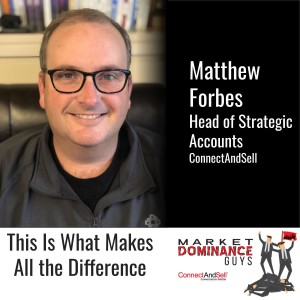
Tuesday Mar 23, 2021
EP74: This Is What Makes All the Difference
Tuesday Mar 23, 2021
Tuesday Mar 23, 2021
“Everybody knows that the flow of discovery meetings is the constraint on their business.” So states Chris Beall, CEO of ConnectAndSell, as he and Corey Frank, our two Market Dominance Guys, continue their interview with Matthew Forbes, Head of Strategic Accounts at ConnectAndSell. Together, they explore the epiphany that is behind Matt’s recent 4-times uptick in his call-to-meeting ratio. So, what is it that increased that flow for Matt recently, and how can others adopt what he learned so that they too can increase the number of meetings they set?
“I think we let people off the hook,” Matt says, “because they’re busy.” It’s second-nature to get apologetic or back down when the prospect starts making noises like, “Not now” or “Call back later.” But Matt’s epiphany about his true belief in the value of the discovery meeting and in the value of ConnectAndSell for the person he’s talking to, has changed the way he delivers his message. “You’ve got to have the right words, but the words only get you so far.” As Matt explains, if you truly believe in what you’re offering, your tone of voice will communicate that belief. As you’ll hear in this week’s Market Dominance Guys’ episode, “This Is What Makes All the Difference.”

Thursday Mar 18, 2021
EP73: You‘d Better Believe It
Thursday Mar 18, 2021
Thursday Mar 18, 2021
This week, our Market Dominance Guys, Chris and Corey, interview Matthew Forbes, Head of Strategic Accounts at ConnectAndSell, about an epiphany Matt had that increased the meetings he set by almost 400%. Wow! What could possibly change that would explain that kind of increase? Well, it’s actually a simple change, but it’s a very necessary one: Matt came to truly believe — deep in his soul — in the potential value of the discovery meeting for his prospects, even if they were never going to do business with ConnectAndSell. His messaging script didn’t change at all. It was his belief that did. Listen to today’s Market Dominance Guys episode, “You’d Better Believe It!” to learn how Matt came to make this meeting-setting leap.

Thursday Mar 11, 2021
EP72: How to Warm Up a Cold Communication
Thursday Mar 11, 2021
Thursday Mar 11, 2021
Over the years, how salespeople make an initial contact for a sale has changed. In these modern times, it has come down to a choice between making a cold phone call or sending a cold email. It seems to be a matter of choice. However, if you’re trying to break through a prospect’s initial fear of being sold to so that you can engender that level of trust necessary to set a meeting or make a sale, which approach should you put YOUR trust in? The human voice? Or a digital communication?
Today, our Market Dominance Guy, Chris Beall, talks with podcast producer Susan Finch about this very question. As CEO of ConnectAndSell, Chris is an impassioned believer in phone conversations first as the most successful tool for setting appointments. Why? Because with your voice, you can employ timbre, tone, pacing, and emotion. In a one-on-one conversation, you can pause for a response, share humor when appropriate, or convey that you understand the other person’s situation. However carefully crafted, an email message can never do as a good a job at interacting with another human being. In pursuing the all-important goal of engendering trust with a prospect, initial phone conversations win, hands down! Listen in to today’s Market Dominance Guys’ episode as Chris shares his well-honed opinions on “How to Warm Up a Cold Communication.”
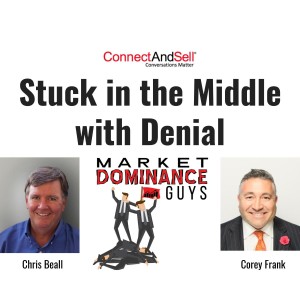
Wednesday Mar 03, 2021
EP71: Stuck in the Middle with Denial
Wednesday Mar 03, 2021
Wednesday Mar 03, 2021
On this week’s episode of the Marketing Dominance Guys, Chris Beall and Corey Frank continue their conversation about the middle phase in the creation of every startup or new product — being stuck. That’s the stage when things aren’t working out the way you’d envisioned them. That’s when prospects aren’t embracing your concept as you’d hoped they would. That’s when you have that sinking feeling that this whole project might be a terrible, terrible mistake. Something’s wrong! Panicking isn’t going to help the situation, but neither is denial. That can lead to faking that everything is just fine — when you know darn well it isn’t. Listen to Chris’ warning: “It’s hard to be honest once you start faking it.” Corey and Chris encourage you to face the truth, because as they say, “The truth is the boss!”
Come listen to how to use your resources to get an honest assessment about why you’re stuck so that you can start moving toward getting your project back in flow. You’ll learn these details and other great advice in this week’s Market Dominance Guys’ episode, “Stuck in the Middle with Denial.”
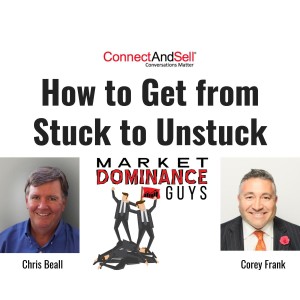
Wednesday Feb 24, 2021
EP70: How to Get from Stuck to Unstuck
Wednesday Feb 24, 2021
Wednesday Feb 24, 2021
This week, the Market Dominance Guys, Chris Beall and Corey Frank, walk you through the three states of cycle time for start-up businesses or for any company that’s trying to launch a new product or service. There’s in flow. There’s stuck. And there’s waiting. Using an example from his own company’s experience launching Flight School, their brand-new sales-rep training program, Chris tells what happened when they thought they were in flow and ready to set meetings for discovery calls, but soon found that prospects didn’t respond as enthusiastically as expected to what his company was offering. In other words, they were stuck.
But what was the problem? It’s a great program! Why weren’t their prospects seeing the value of what was being offered? Chris explains that it’s often necessary to put your own narcissism aside in order to clearly look at all the possible reasons why you’re not moving toward success as quickly as you think you should be. Only then can you be open to exploring and utilizing all the resources that might help you get unstuck. As he says, “You need to plumb the depths of your ignorance! You need knowledge!” As practical and helpful as usual, our Market Dominance Guys offer advice on this common problem encountered by almost every startup company. Join them for today’s episode, “How to Get from Stuck to Unstuck.”
--------------------------------

Wednesday Feb 17, 2021
EP69: The Right Skills for the Job - AI vs. Humans
Wednesday Feb 17, 2021
Wednesday Feb 17, 2021
Chris Beall and Corey Frank, our Market Dominance Guys, explore the subject of artificial intelligence taking over jobs held by humans. It’s an emotional issue, to be sure. But instead of looking at this as an either/or concern, the Market Dominance Guys take a different tack by asking,” What do humans do well? What do machines do well? And what can they do together?” You may be thinking, “Wait a minute! Using AI will help us run our business much more cheaply than keeping all those humans on our payroll.” If so, Chris asks you to take a few steps back and look at the big picture by asking yourself, “What’s my main goal here?” In other words, should you be concentrating on how to operate your company more cheaply, or should you be thinking about what will help you dominate your market? And what skill sets are required for your company to do that?
Using a sales department as an example, Chris and Corey discuss the different cluster of skills needed for each type of job in that division and which ones can be handled by either humans or artificial intelligence — or by a combination of both. As usual, you can trust the Market Dominance Guys to steer you in the right direction when it comes to dominating YOUR market, just as they do on today’s podcast, “The Right Skills for the Job.”
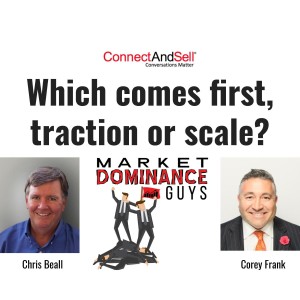
Wednesday Feb 10, 2021
EP68: Which Comes First, Traction or Scale?
Wednesday Feb 10, 2021
Wednesday Feb 10, 2021
Our Market Dominance Guys, Chris Beall and Corey Frank, continue their discussion about churn and its various causes. Today’s topic is about how a company’s growth is managed. Are the guiding forces going after traction first? Or are they jumping right into how to scale before they have worked out their product’s kinks? Chris and Corey talk about the tragedy of designing for scale before you have traction. As Chris will tell you, it’s a fool’s errand. If you have no traction, no conversations with your buyers, then you’re not going to learn anything about what your customers need or about why they may not be coming back. Once again, market dominance is achieved when you investigate your churn! And that’s done with conversations.
Today’s podcast winds up with a question of “Who’s in charge here?” when it comes to how to steer a company toward success. Is it the investors you’ve taken money from, who may be pressuring you to scale quickly? Or is it your customers, who, if asked, will tell you what they do or don’t like about your product or service, guiding you toward what you should do to keep them renewing? Listen in to what Chris and Corey think about this important matter on today’s Market Dominance Guys’ episode, “Which Comes First? Traction or Scale?”
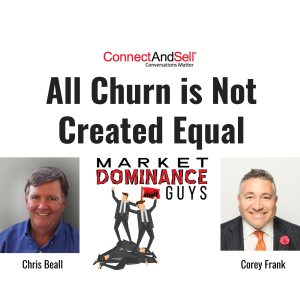
Wednesday Feb 03, 2021
EP67: All Churn is Not Created Equal
Wednesday Feb 03, 2021
Wednesday Feb 03, 2021
Our Market Dominance Guys, Chris and Corey, are back this week with an episode about “churn.” No, they’re not talking about butter-making here. They’re addressing business churn — a measurement of cancellations or non-renewals of your company’s product or service. Are you thinking, “Churn: What can I do about it?” If you’re like many people, you may look at your company’s churn rate, give a philosophical shrug, and go back to hunting for more prospects to replace those MIA customers. But is it really easier to find new customers than it is to figure out what went wrong? As the folk-rock band, The Byrds, might have sung in the 60s, “To every cancellation (churn, churn, churn), there is a reason (churn, churn, churn).”
Corey points out that some churn is inevitable, but not all churn. Examination of cause and effect is needed! In a spirit of solidarity, Chris comes clean about what unexamined churn cost ConnectAndSell, the company he works for. He explains that he had to put arrogance aside and face the fact that their customers weren’t getting the full benefit from ConnectAndSell’s sales- acceleration platform simply because reps didn’t know how to successfully conduct a cold call. And, thus, a training program was born. Yes, it’s shine-a-bright-light-on-the-problem time on the Market Dominance Guys in today’s episode, “All Churn Is Not Created Equal.”
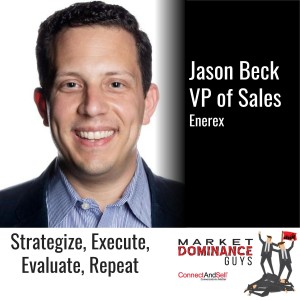
Wednesday Jan 27, 2021
EP66: Strategize, Execute, Evaluate, Repeat
Wednesday Jan 27, 2021
Wednesday Jan 27, 2021
On today’s episode of the Market Dominance Guys, Chris and Corey continue their conversation with Jason Beck, Vice President of Sales at Enerex, by addressing how sales got a dirty name. Chris explains that in ancient times, the salesman met the buyer face to face, but the encounter was usually a one-time transaction. Then, the camel caravan moved on, and if the buyer wasn’t happy with his purchase, there was no one to appeal to for a replacement and no one to lodge a customer complaint with. Ancient sales was a hit-and-run relationship that frequently left a bad taste in the buyer’s mouth about salesmen. But in modern times, the sale is never over, because the telephone and the internet have created an ongoing relationship between sellers and buyers. The modern salesperson needs to understand that you can run, but you can’t hide, which makes it imperative that reps provide value to their customers.
Jason and the Market Dominance Guys segue into a discussion of what type of personalities are best suited to be salespeople and what types should definitely NOT hold this job. The attributes of being pro-active and persistent are touted, as well as the importance of being in sales for the right reasons. As Jason puts it, “If closing the deal at the end of the day isn’t what you live for, then don’t be in sales.”
This team of sales-savvy guys wraps things up with a discussion of the cycle of the sales process for a new product and why it works — as this podcast’s title says — to Strategize, Execute, Evaluate, and Repeat.
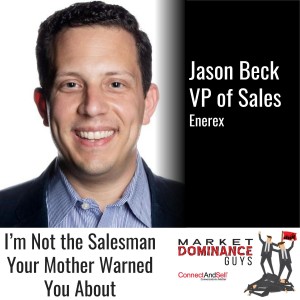
Wednesday Jan 20, 2021
EP65: I’m Not the Salesman Your Mother Warned You About
Wednesday Jan 20, 2021
Wednesday Jan 20, 2021
The Market Dominance Guys, Chris and Corey, welcome a new guest this week: Jason Beck, Vice President of Sales at Enerex. Or as Corey dubbed him — the Pied Piper of Retail Energy.
The topic today? What leads to the adoption of a new product or service.
Jason is a big believer in the role of trust in establishing business relationships that will lead to adoption. “Trust is so hard to gain,” he says, “and so easy to lose.” In gaining trust, it’s a two-step program, Jason explains. First, be honest in the claims you make about your product’s value — not as you hope it will one day perform, but as it performs today. And second, find out what your prospects fear most and make sure you and your company are none of those things. If you’re trying to dominate any market, Jason continues, you need to be working toward that tipping point where your initial adopters, whose trust you have successfully gained, will begin vouching for you to your new prospects.
Chris, Corey, and Jason end the podcast with a frank discussion about that dirty word “sales.” They talk about the negative reputation sales acquired and why people fear being sold to. You’ll want to listen in for Chris’ insights about how to turn that frown upside down by shining a brighter light on the necessary role of salespeople in the B2B world. Join us for this episode of The Market Dominance Guys: I’m Not the Salesman Your Mother Warned You About.
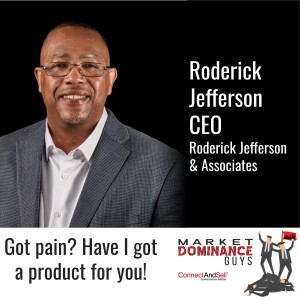
Tuesday Jan 12, 2021
EP64: Got Pain? Have I Got a Product for You
Tuesday Jan 12, 2021
Tuesday Jan 12, 2021
Join us on the Market Dominance Guys as Chris and Corey continue their conversation about sales enablement with CEO Roderick Jefferson of Roderick Jefferson & Associates. This week, the guys address the challenge of hiring the right people for this function — people who have a certain level of sales credibility within the company. Roderick explains that in order to be a respected voice and get a vote when it comes to providing sales enablement tools and processes to support the sales team, you need to bring people on board who have extensive sales experience.
Now, don’t get him wrong: Roderick is not advocating a perpetual continuation of “Do sales the way we’ve always done sales.” Instead, he suggests hiring those who understand that what really works in sales is helping clients maintain their customer roster, and aiding clients with increasing THEIR profits, reducing THEIR costs, and mitigating THEIR risks. In other words, your need to hire a sales enablement team dedicated to having conversations with prospects about business outcome. Roderick states that to do this, sales people have to stop giving presentations and start having conversations — true discovery conversations.
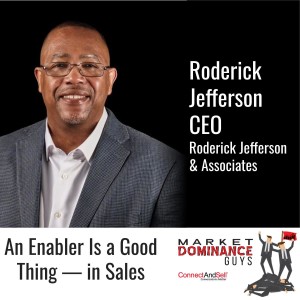
Wednesday Jan 06, 2021
EP63: An Enabler Is a Good Thing — in Sales
Wednesday Jan 06, 2021
Wednesday Jan 06, 2021
Today on the Market Dominance Guys, you’re invited to join Chris and Corey and their guest, Roderick Jefferson, the CEO of Roderick Jefferson & Associates, a global sales enablement consultancy firm. This trio of sales gurus outlines the whys and how's of providing sales teams with the information, training, content, and tools that reps need to successfully engage buyers throughout the buying journey. This is known as “sales enablement.” Sounds like a pretty simple “follow the blueprints” process, doesn’t it? And, yet, as Roderick informs us, if you ask 10 people what sales enablement is, you’ll get a multitude of answers.
Chris and Roderick discuss this quandary and, more specifically, how the pandemic has impacted training and overseeing sales teams now that each rep works from home, physically away from their manager’s watchful eye. Roderick relates this problem to that of an orchestra whose conductor is missing. Like so many other things now, sales enablement must be fine-tuned to this new situation. In order to orchestrate and conduct a sales team so that each rep plays their part and uses the provided resources in a collaborative manner, a major change must take place in how they are managed.
If you’re a follower of the Market Dominance Guys, you know that this episode will have you nodding along with the opinions of Chris, Corey, and their guest, and jotting down notes from their insights. Stay tuned! They aim to help you dominate your market!
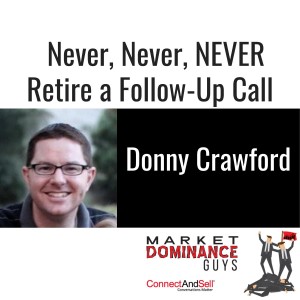
Wednesday Dec 23, 2020
EP62: Never, Never, NEVER Retire a Follow-Up Call
Wednesday Dec 23, 2020
Wednesday Dec 23, 2020
In this follow-up to last week’s Market Dominance Guys’ podcast, “Your Sales People Are Brain Surgeons,” Chris and Corey have another conversation with ConnectAndSell’s customer success manager, Donny Crawford, about using the telephone plus your beliefs to gain market dominance.
First things first, they discuss how to get prospects on the phone who are the most likely to set a meeting with you. It sounds like a numbers game — more dialing equals more people picking up the phone, which equals more meetings set, right? But as every sales rep knows, you can lead a prospect to a conversation, but you can’t make them link you to their calendar. That rate of success is fairly low. In his experience calling on prospects, though, Donny discovered an amazing way to increase the dial-to-meeting conversion rate: make more calls to people on your follow-up list. He found out that if at first you don’t succeed, call, call, call again. Wait till you hear what his success rate is — and then listen to the story Chris tells about follow-up calls, which corroborates Donny’s experience.
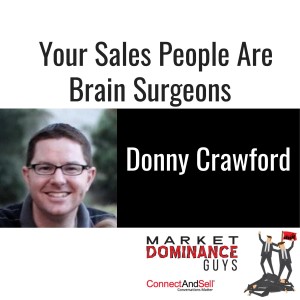
Wednesday Dec 16, 2020
EP61: Your Sales People Are Brain Surgeons
Wednesday Dec 16, 2020
Wednesday Dec 16, 2020
What do you do if you have a group of 25 or so folks on your sales team, and you want to really make a splash in the first quarter of the new year? Due to the on-going pandemic, we all know that connecting with customers face to face at trade shows is no longer an option. No doubt, your reps are still working from home, most of them researching their prospects and trying a little social media marketing, but all of them eventually doing the traditional dialing, dialing, dialing, and praying, praying, praying that someone will pick up the phone. How, in the name of all that’s financially holy, are your reps going to help your company dominate its market if they simply continue to use the same old methods during this brave new year we are entering?
Our two Market Dominance Guys, Chris and Corey, along with this week’s guest, ConnectAndSell Customer Success Manager Donny Crawford, diagnose the problem of what’s keeping companies from the market domination they desire. These three cold-calling practitioners offer their insights into what works best to get the greatest number of conversations with decision makers — despite cold call outcomes like “Not me,” “Not now,” “Not interested,” “Call back later,” or even the dreaded hang-up. Wait till you hear Donny’s proven method for how to turn repeated hang-ups from a prospect into the appointment you’re after.
Chris compares the work of a salesperson to that of a brain surgeon, first cracking open a company’s “skull” by getting that first appointment, and then exploring what’s wrong inside the “brains” of a company by having a discovery conversation. Join Chris, Corey, and Donny as they guide you through that operation during this episode of Market Dominance guys, "Your Sales People are Brain Surgeons."

Wednesday Dec 09, 2020
EP60: Diagnosing Discovery Call Failures
Wednesday Dec 09, 2020
Wednesday Dec 09, 2020
In this episode of Market Dominance Guys, we’ll dissect that sales process called the “discovery call” and diagnose the problem that is keeping sales reps from making a successful one. Chris, Corey, and Oren Klaff, managing director of Intersection Capital, share their opinions on the subject, and lament the unfortunate fact that most sales reps have no set method for conducting a discovery call that includes true discovery.
As Oren describes it, “Selling is a bit icky, and [salespeople] want to retreat quickly back to the relative calm of their normal lives. Once a salesperson hears one thing [from the prospect] that’s an indicator of interest, they want to hit the buzzer” and immediately jump to the sales pitch so they can end their own discomfort. As Oren sees it, this cut-to-the-chase method is the primary reason many discovery calls fail. Instead of truly finding out what problems the prospect or his company might have, which the product being offered might solve, reps skip right over the creation of a relationship that might help them eventually make that sale. Chris is convinced that salespeople can actually be coached on where they went wrong during a discovery call and how to do it in a way that works. In this podcast, you can listen to the two questions that Chris begins his own discovery calls with — and then find out what the heck “the dog, the meat, and the chain-link fence” have to do with this subject. Who knew that a discussion about discovery calls could be so insightful and entertaining?
If you missed the first half of this conversation, you can get it here:
https://marketdominanceguys.com/e/getting-prospects-from-fear-to-commitment/

Wednesday Dec 02, 2020
EP59: Getting Prospects from Fear to Commitment
Wednesday Dec 02, 2020
Wednesday Dec 02, 2020
You’re about to make a cold call, hoping to get a commitment out of your prospect. What are you feeling? A little trepidation, perhaps? As all salespeople know, that’s the fear of rejection. But have you ever considered that your prospect is feeling some fear too? It’s true: most prospective customers feel the fear of having to talk to an invisible stranger. That’s a lousy way to start a conversation with someone you’re wanting a commitment from. So, how do you, an invisible stranger, get your prospect, an unknown person, to go quickly from fear to trust, then from trust to curiosity, and, finally, from curiosity to commitment — all in about a half of a minute? And how do you do it so the call doesn’t end with a disappointing outcome? Chris, Corey, and today’s Market Dominance Guys’ guest, Oren Klaff, managing director of Intersection Capital, tackle this challenge with a discussion about trust and how to manufacture it, especially at the speed and scale necessary for startup founders to glean success — before their new venture runs out of money.
Listen to the continuation of this passionate conversation:
https://marketdominanceguys.com/e/why-cutting-to-the-chase-in-discovery-calls-fails/

Wednesday Nov 25, 2020
EP58: Your Prospect Adores You! But Will His CFO?
Wednesday Nov 25, 2020
Wednesday Nov 25, 2020
Every single thing that happens in sales is about learning — on both parties’ parts — and this includes presenting and discussing value metrics with prospects and with customers who are up for renewal. What works best? Adopting an attitude of rampant optimism or one of friendly skepticism? Should the value metrics you present be the same, or should they vary when you’re talking with inbound prospects versus outbound prospects? Is it most effective to emphasize only one appealing value, or is it better to trot out several beneficial metrics?
In this third Market Dominance Guys’ conversation between Chris, Corey, and Mike Genstil, co-founder and CEO of VisualizeROI, this trio of experts discusses how to price your company’s offering, how to handle discount requests, and what to do about a prospect’s fixed-budget limitations. Most importantly, they delve into the reality of what happens when you have successfully convinced a prospect of the value of your offering — to the extent that he is now a champion of your product or service — but when he carries your banner back to his company, he is faced with a bunch of skeptics who haven’t had the benefit of hearing your pitch. Since 98.3% of all sales decisions are fought internally, you’ll want to hear the strategy Chris, Corey, and Mike suggest for arming your prospect with the value metrics that will help him win that battle.

Wednesday Nov 18, 2020
EP57: What to Charge for a Trip to the Promised Land
Wednesday Nov 18, 2020
Wednesday Nov 18, 2020
As a follow-up to the recent Market Dominance Guys’ podcast, “Vanity, Vanity, Thy Name Is Value Metrics,” Chris and Corey continue here with part two of their conversation with Mike Genstil, co-founder and CEO of VisualizeROI. Mike and Chris share their insights into value metrics and how to construct and present statements about value propositions and returns on investment. These market dominance experts explain that it’s all dependent upon the job title of the customer rep being addressed, as well as where in the sales cycle you are with that company. Is risk mitigation the most appropriate metric? Is it perhaps better to talk about productivity gains? Or would a statement regarding cost savings be more enticing as a promised ROI? And, as Corey asks, whose job is it to craft the appropriate statement for the value prop or ROI?
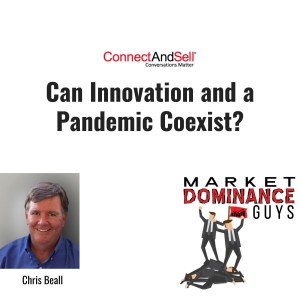
Wednesday Nov 11, 2020
EP56: Can Innovation and a Pandemic Coexist?
Wednesday Nov 11, 2020
Wednesday Nov 11, 2020
Change is the obvious hallmark of the current pandemic. And, as most of us know, change rewards innovation and punishes those who stand pat on tradition. This is especially true in the winner-takes-all world of sales. Most people believe that true innovation springs from the use of technology. But is innovation mostly about taking a technological product or service and then marketing and promoting it to the stage called “user adoption” — or even to the more desirable stage that we’ll call “user embrace”? Or should innovation be more cultural than technical?
Join Chris as he makes the case for pursuing innovation during the pandemic and talks about the difference between strategy and tactics during this pursuit. Chris is joined by his friend, Gerhard Gschwandtner, founder and CEO of Selling Power, Inc., as they discuss the role of empathy in sales and its importance as a leadership tool.

Subscribe to episodes via email:
We are in the midst of an exciting yet seismic change across the profession of modern sales. Improved (and much smarter) marketing tools, more compelling sales methodologies, better-designed datasets, and even the introduction of Artificial Intelligence have all lent a hand to upgraded efficiency and higher close rates. The unshakable mission of a company, however, remains constant - if not all the more elusive: "Those that dominate their market are those that are going to win." Join Chris Beall and Corey Frank for a journey into the vast forces, best practices, and simple paths that can propel your organization to reach true market dominance.
Chris Beall - Your Co-host
Chris has been participating in software start-ups as a founder or at a very early stage for most of the past 35 years. His focus has consistently been on creating and taking to market simple products that can be used successfully the first time they are touched, without taking a course or reading a manual. His belief is that the most powerful part of any software system is the human being that we inappropriately call a “user”, and that the value key in software is to let the computer do what it does well (go fast without getting bored) in order to free up human potential.
Corey Frank - Your Co-host
Corey Frank is – at heart – an idea guy, as well as a sales guy, who can take a good punch…repeatedly. He loves launching relevant technology, shepherding culture-rich and sales-driven organizations and cultivating teams to spark serious revenue.
From founding and helping early-stage technology companies from the kitchen table phase to helping bring them all the way to IPO or strategic acquisitions totaling over $625MM, he’s also helped pitch and raise over $200MM in venture and Reg A capital. He is a Partner and Pitch Coach with multiple #1 best-selling sales author Oren Klaff (Orenklaff.com) at PitchAnything.com.










